自考英美文学我就是靠这资料过的
自考英美文学选读00604考前串讲(1-10)
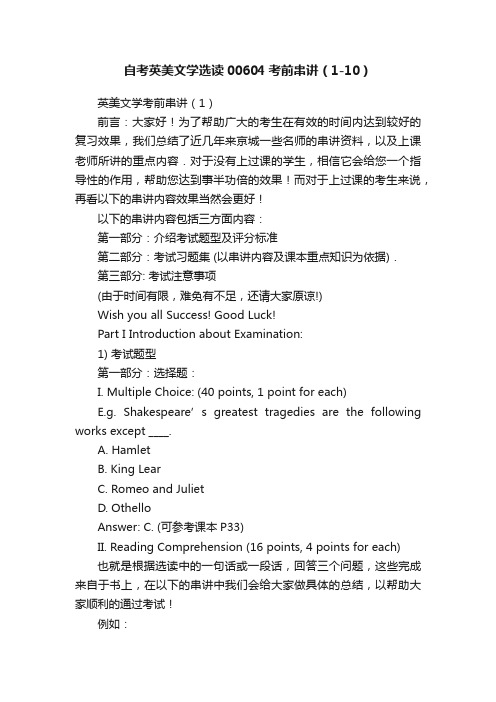
自考英美文学选读00604考前串讲(1-10)英美文学考前串讲(1)前言:大家好!为了帮助广大的考生在有效的时间内达到较好的复习效果,我们总结了近几年来京城一些名师的串讲资料,以及上课老师所讲的重点内容.对于没有上过课的学生,相信它会给您一个指导性的作用,帮助您达到事半功倍的效果!而对于上过课的考生来说,再看以下的串讲内容效果当然会更好!以下的串讲内容包括三方面内容:第一部分:介绍考试题型及评分标准第二部分:考试习题集 (以串讲内容及课本重点知识为依据).第三部分: 考试注意事项(由于时间有限,难免有不足,还请大家原谅!)Wish you all Success! Good Luck!Part I Introduction about Examination:1) 考试题型第一部分:选择题:I. Multiple Choice: (40 points, 1 point for each)E.g. Shakespeare’s greatest tragedies are the following works except ____.A. HamletB. King LearC. Romeo and JulietD. OthelloAnswer: C. (可参考课本P33)II. Reading Comprehension (16 points, 4 points for each)也就是根据选读中的一句话或一段话,回答三个问题,这些完成来自于书上,在以下的串讲中我们会给大家做具体的总结,以帮助大家顺利的通过考试!例如:2001年考过的一个题目:“Wild Spirit, which art moving everywhere;/Destroy and Preserver’ hear, O hear!”Questions:A. Identify the poem and the poet.B. What is the "Wild Spirit"?C. What does the "Wild Spirit" destroy and preserve?Answer:A: Shelly’s "Ode to the West wind"雪莱的《西风颂》B. The West wind: "breath of Autumn’s being’’C. It destroys things /thoughts / idea that are dead, it preserves new life. (or seeds that represent new life or new birth.) (可参考课本P211)评分标准:A,B,各1分,C,2分. 语言错误酌情扣分第二部分是非选择题 (共44分)III. Questions and Answers (24 points in all, 6 points for each) 例如:"My boy!" said the old gentleman, learning over the desk. Oliver started at the sound. He might be excused for doing so, for the words were kindly said, and strange sounds frighten one. He trembled violently, and burst into tears." (Charles Dickens, Oliver Twist)Explain why the boy (Oliver Twist) started first, then trembled violently and burst into tears when the words were” kindly" said.参考答案:The boy started at the words because kind words were not expected; it is (was, must be) the first time in all his life that the boy (Oliver Twist) had been “kindly” greeted; strange sounds may predict another suffering/misfortune/tortu re/…) (At least one example from the text to back up the above statement.)评分标准:概述占4分, 例子占2分.语言错误酌情扣分.IV. Topic discussion (20 points in all, 10 points for each)Write no less than 150 words on each of the following topics in English in the corresponding space on the answer sheet.例如:Mark Twin presented the 19th century American in his own unique way. Discuss Twain’s art of fiction: the setting, the language, and the characters, etc., based on his novel The Adventures of Huckleberry Finn.参考答案:A.Mark Twain uses the Mississippi alley as his fictional kingdom, writing about the landscape and people, the customs and the dialects of one particular region, and therefore known as a local colorist.B.He creates life-like characters, especially the unconventional Huckleberry Finn, who runs away from civilization and stands opposite to conventional village morality.C.He uses a simple, direct vernacular language, totally different from any precious literary language. It is the kind of colloquial language belonging to the lower class, the living local American English.D.He has created a special humor to satirize social injustice and the decayed convention.英美文学考前串讲(2)Part One: English LiteratureChapter I An Introduction to Old and Medieval English Literature & The Renaissance PeriodI. Choose the right answer:1. Dr. Faustus is a play based on the _____legend of a magicianaspiring for ____ and finally meeting his tragic end as a result of selling his soul to the Devil.A.British/ immoralityB.French/moneyC.German/knowledgeD.American/political powerAnswer: C (可参考课本P21)2. _____, is a typical example of Old English poetry, is regarded today as the national epicof the Anglo-Saxons.A.The Wife’s ComplaintB.BeowulfC.The Dream of the RoodD.The SeafarerAnswer: B (可参考课本P1)3.It’s Chaucer alone who, for the first time in English literature, presented to us a comprehensive realistic picture of the English Society in his masterpiece__________.A.The Canterbury TalesB.The Legend of Good WomenC.Troilus and CriseydeD. The Romaunt of the Rose.Answer: A (可参考课本P4)4. The Essence of Renaissance, the most significant intellectual movement, was_____.A. Geographical explorationB. Religious reformationC. Publishing and translationD. Humanism.Answer: D (可参考课本P8)5. “Prince Arthur’s greatest mission is his search for Gloriana, with whom he has fallen in love through a love vision.”The two figures come from_____.A.Paradise LostB.Dr. FaustusC.The Faerie QueeneD.HamletAnswer: C (可参考课本P13)6. In “Sonnet 18”, Shakespeare_________________.A.Meditate on the destructive power of time and eternal beauty by poetry.B.Satirize human’s vanity.C.Predict the eternity of love.D.Eulogize the power of the beauty.Answer: A (P37)7. ____ gave new vigor to the blank verse with his “mighty lines” and make ’blank verse’the principle vehicle of expression in drama.A.SurreyB.WyattC.MarloweD.SidneyAnswer: C (P21)8. Shakespeare’s greatest tragedies are the following works except____.A.HamletB.King LearC.Romeo and JulietD.OthelloAnswer: C (P33)9. The Renaissance refers to between 14th----mid-17th century, which was under the reign of Queen___and absolute monarchy in England reached its summit, and in which the ’real mainstream (真正的文学主流)’ was ____.A.Victoria/poetryB.Elizabeth/ dramaC.Mary/ novelD.James/ dramaAnswer: B (P11)10. In The Legend of Good Women, Chaucer used for the first time in English the rhymed couplet of iambic pentameter, which is to be called later____.A.The Spenserian stanzaB.The heroic coupletC.The blank verseD.The free verseAnswer: B (P5)11. The Redcrosse Knight in “The Faerie Queene” stands for_____, and Una stands for_____.A.bravery/ chastityB.holiness/ truthC.error/ deliveryD.true gentleman/ lady.Answer: B (P16)12. Which of the following is NOT regarded as one of the characteristics of Renaissance?A.Rediscovery of ancient Roman and Greek culture.B.Attempt to remove the old feudalist ideas in Medieval Europe.C.Exaltation of man’s pursuit of happiness in his life, and tolerance of man’s f oibles.D.Praise of man’s efforts in soul delivery and personal salvation.Answer: D (P7)13. “The slings and arrows of outrageous fortune” is an example of ______.A.MetaphorB.SimileC.IronyD.PersonificationAnswer: A (P55)14. _____ introduced the Petrarchan sonnet into England.A.Anglos/ SaxonsB.Normans/ Anglo-SaxonsC.Greeks/ RomansD.Romans/ NormansAnswer: B (P11)15. It is ___ alone who, for the first time in English literature presented to us a comprehe nsive realistic picture of the English society of his time and created a whole gallery of vivid characters from all walks of life.A.Edmund SpenserB.Geoffrey ChaucerC.William ShakespeareD.John DonneAnswer: B (P4)16. The following belong to the characteristics of ’metaphysical poetry’ represented by ’John Donne’ except___.A.ConceitsB.Actual imagery and simple dictionC.Argumentative formD.Elegant styleAnswer: D (P63)17. Paradise Lost is actually a story taken from____.A.Greek MythologyB.Roman legendC.The Old TestamentD.The New TestamentAnswer: C (P73)18. In “Paradise Lost”, Satan says “We may with more successful hope resolve/ To wage by force or guile eternal war, / Irreconcilable to our grand Foe” What does the “Eternal war”mean?A.To remove God from his throneB.To burn the Heaven DownC.To corrupt God’s creation of man and woman-----Adam and EveD.To beguile into a snake to threaten man’s lifeAnswer: C (P71, 节选部分在P75)19. _____, the first of the great tragedies, is generally regarded as Shakespeare’s most po pular play o n the stage, for it has the qualities of a “blood-and-thunder” thriller and a ’philosophical exploration’ of life and death.A.The Merchant of VeniceB.HamletC.King LearD.The Winter’s TaleAnswer: B (P33)20. It was ___and ___ the two conquests that provided the source for the rise and growth ofEnglish literature.A.Anglos/ SaxonsB.Normans/ Anglo-SaxonsC.Romans/ NormansD.Greeks/ RomansAnswer: B (P1)21. Paradise Lost is ___’s masterpiece, which is an epic in 12 books, written in blank verse, abo ut the heroic revolt of Satan against God’s authority.A.John DonneB.Christopher MarloweC.John MiltonD.Edmund SpenserAnswer: C (P71)22. The following description fit into Milton ’except’_____.A.a great revolutionary poet of the 17th centuryB.an outstanding political pamphleteerC.a great stylist and master of blank verseD.a kind of elegant and refine style.Answer: D (P70---73)23. _____is not written by John Milton.A.Samson AgonistesB.Paradise LostC.Paradise regainedD.TamburlaineAnswer: D (P71)24. Marlow’s greatest achievement is that he perfected the ’blank verse’, and he is regarded as ’the pioneer of English drama’, which of the following is not written by him?A.TamburlaineB.The Jew of MaltaC.The Passionate to His LoveD.The Sun RisingAnswer: D (P20)25. ____Essays is the first example of that genre in English literature, which has been recgnized as an important landmark in the development of English prose.A.John Milton’sB.Francis Bacon’sC.Montaigne’sD.Thomas Gray’sAnswer: B (P58)26._____Was known as “the poets’poet”.A.William ShakespeareB.Edmund SpenserC.John DonneD.John MiltonAnswer: B (P15)27. “And we will make thee beds of roses / And a thousand fragrant posies/ A cap of flowers, and a kirtle/ Embroidered all with leaves of myrtle.”The above lines are probably taken from______.A.Spenser’s The Faerie Queene27.B.John Donne’s The Sun RisingC.Shakespeare’s Sonnet 18D.Marlow’s The Passionate Shepherd to His Love.Answer: D (P28)28. Which of the following statement best illustrates the theme of Shakespeare’s Sonnet 18?A.The speaker eulogizes the power of Nature.B.The speaker satirizes human vanity.C.The speaker praises the power of artistic creation.D.The speaker meditates on man’s salvation.Answer: C (P37)II. Read the quoted part and answer the questions:1.“For herein Fortune shows herself more kindThan is her custom. It is still her useTo let the wretched man outlive his wealth,To view with hollow eye and wrinkled browAn age of poverty; from which ling’ring pe nanceOf such misery doth she cut me off”1.Identify the title of the works and author.2.Explain “from which…cut me off”.3.What happened to him, which caused the words?参考答案:The lines are from “The Merchant of Venice”,William Shakespeare. (P48)2) This sentence means she, ’Lady Fortune(命运女神)’, is more kind to him because she is taking away both his wealth and life.3) The speaker is Antonio, it’s said that his ship have all been lost, and he is penniless, and will have to pay the pound of flesh. (Because Shylock has made a strange bond that requiresAntonio to pay him a pound of flesh if he can’t repay him the money that he borrowed for his friend in due time.) (P38)2.“Read not to contract and confuse, not to believe and take for granted, nor to find talk and discourse, but to weigh and consider”1)Identify the work and author.2)What idea does the passage express?参考答案:1) The sentence comes from “Of Studies”written by ’Francis Bacon’. (P61)2) The Sentence talks about the proper way to read: When you r ead, don’t be puzzled by the content of the book; don’t take it for granted; don’t quote too much from the book; before accepting its idea, you’d better think about its shortcomings and consider it from all sides.3.“Nor lose possession of that fair thou ow’st;Nor shall death brag thou wander’st in his shade,When in eternal lines to time thou grow’st:So long as men can breathe, or eyes can see,So long lives this, and this gives life to thee.1) Where does the poem comes from? Who wrote it?What does “eternal lines”mean?Interpret it briefly.参考答案:1) The poem is “Shall I Compare thee to a Summer’s Day”, by Shakespeare. (P38)2) Eternal lines means the lines of the poem and other sonnets. (P38)3) It means: you will not lose your beauty, and death will not threaten you with darkness, either. As long as man can live in theworld, they will see your beauty in my lines of my poem, which has given you eternal life. (Or A nice summer’s day is usually transient, but the beauty in poetry can last for ever. (P37)4.“…All is no lost: the unconquerable will,And study of revenge, immortal hate,And courage never to submit or yield:And what is else not to be overcome?……Irreconcilable to our grand Foe”1) Please identify the poem and the poet.2) Interpret“all is not lost”.3) What does the whole passage mean?参考答案:1) It is taken from John Milton’s “Paradise Lost”.(P74)2) “all is not lost”is the word from Satan----Satan and other angels rebel against God, but they are driven from Heaven into hell. In the fire of the hell, Satan is determined to fight back, just like what he says: not all is lost, the unconquerable will, the deep hatred, and the courage to fight till death still remain. (P71)3) This passage shows Satan’s will not to submit (服从), and the desire to long for freedom; to beg God for mercy and worship his power is more shameful and disgraceful than the downfall.(P71)5.“If he be not apt to beat over matters, let him study the lawyer’s cases. So every defect of the mind may have a special receipt.”Questions:3)What does “beat over matters”mean?4)What does “receipt’refer to?5)From which essay does the above sentences come, what is the essay mainly about?参考答案:1)It means: make through examinations of things. (P63)2)“Receipt”refers to cure, prescription. (P63)3)The sentences are from “Of Studies”(Francis Bacon). It is the most popular of bacon’s essays. It analyzes what studies chiefly serve for, the different ways adopted by different people to pursue studies, and how studies exert influence over human character. (P60—61)6.“What, is great Mephistophilis to passionateFor being deprived of the joys of heaven?Learn thou of Faustus manly fortitudeAnd scorn those joys thou never shalt possess.……Say he will spare him Four and twenty yearsLetting him live in all voluptuousnessHaving thee ever to attend on me…Questions:1)Identify the passage and author;2)“Say he surrenders up to him his soul”, who will surrender his soul? What for?3)Who are thee? What will he do?参考答案:1) The passage come s from “Dr.Faustus”written by Christopher Marlowe. (P25—26)2) Dr.Faustus will surrender his soul to devil. Because he wasa great scholar who has a strong desire to ’get knowledge’in vain, finally he ’made a bond’to sell his soul to Devil in return for 24 years of life in which he may get anything he desires. (P22)3) The “thee”, refers to “Mephistophilis”, the Devil’s servant.He helped Dr.Faustus to do anything he wants. (P22)7.“Busy old fool, unruly sun,Why does thou thus,Through windows and through curtains call on us?”Questions:6)Identify the work and author.7)What idea does the passage express?参考答案:1)The passage comes from “The Sun Rising”, written by ’John Donne’. (P66)2) The speaker questions the sun’s authority and speaks condescendingly, placing the sun in the status of a subordinate. In the lover’s kingdom, the sun has no right to dictate the time of day or the passing of seasons. His presence in their bedchamber is an intrusion on their privacy.III. Questions and answers:1.How do you know about Renaissance? Give a summery about English literature in the period?(No more than 150 words)参考答案:1.The Renaissance refers to the period between 14th----mid-17th century. It first started in Italy.2.The Renaissance means rebirth or revival----the discovery of ancient Roman and Greek culture.3.In essence, The Renaissance is a historical period in which the European humanist thinkers and scholars tried to get rid of the old feudalist ideas in medieval Europe, to introduce new ideas that expressed the interests of the rising bourgeoisie/middle class, and to recover the purity of the early church from the corruption of Roman Catholic church.4.Humanism is the essence of Renaissance -----Man is the measure of all things. The humanism exalted/praised human nature and emphasized the dignity of human beings and the present life. They thought man had the right to enjoy the beauty of life and had the ability to perfect himself and made wonders, which got ready for the appearance of the great Elizabethan writers in Britain. Poetry and drama were the most outstanding literary forms.5.Shakespeare, Marlowe and Francis Bacon etc. were the remarkable representatives of the English Renaissance. (可参考课本P7---12)2. Please give a brief analysis of Hamlet’s “T o be or not to be”soliloquy (独白).参考答案:“To be or not to be”is ’a philosophical exploration of life and death’. The soliloquy condemned the hypocrisy and treachery and general corruption of the world, and revealed the character of Hamlet---so ’speculative, questioning, contemplative and melancholy./gloomy’. It was not because he was not able to take action to revenge, but because of his ’hesitative/hesitant character’, when the chance for acti on came, it seemed defeat.It can be interpreted as: Hamlet bears the heavy burden of the duty to revenge his father’s death, he is forced to live in the suspense of facts and fiction, language and action. He considers that it would be better to ’commit suicide’, but being scared of what might happen to him in the afterlife. So he put off the thing because of the sin. He considers the plan carefully only to find reason for not carrying it out. The soliloquy conveys ’the sense of world-weariness (厌世)’. (P33-34)3. What common features do the characters share in Marlow’s works? (No more than 150 words)参考答案:The creation of The Renaissance hero is one of Marlow’s contributions.1)Such a hero is always individualistic and full of ambition, facing bravely the challenge from god and men. They had human dignity and capacity, trying to get heaven/highest ideas on the earth by their own efforts.2)For example: T amburlaine is a character written by Marlowe. By depicting a great hero with high ambition and sheer brutal forc4e in conquering, Marlowe voiced the supreme desire of man for infinite/ limitless power and authority. In Dr.Faustus, Marlowe celebrated the human passion for knowledge, power and happiness.3) Tamburlaine and Dr.Faustus are typical in owning such Renaissance spirit, Tamburlaine, being a cruel conquer, found happiness in conquering other kingdom. Only death could defeat him. While Dr.Faustus, a more introspective and philosophical figure, had high spirit for knowledge but he had sin for having despair in God and trust in Devil. (P20—22)4. What are the main themes of Shakespeare’s plays?参考答案:Shakespeare’s plays are divided into 3 types: comedies, tragedies and historical plays.1) His historical plays are with the theme-----national unity under a might and just sovereign/ruler is necessary.2)In his romantic comedies, he takes an optimistic attitude toward love friendship and youth.3)In his tragedies, Shakespeare always portrays some nobleheroes, who faces the injustice of life and is caught ina difficult situation and whose fate is closely connected with the fate of his nation. Each hero has his weakness of nature. We also see the conflict between the individual and the evil force in the society. And his major characters are always individuals representing certain types.5. Please comment on the character of Satan in “Paradise Lost.”参考答案:Satan is a rebellious (叛逆的) figure against God in literature, defeated, he and his rebel angels were cast into hell. However, Satan refused to accept his failure, swearing that “all was not lost”and that he would revenge for his downfall. The freedom of the will is the keystone of Satan’s character, which was the important spirit of the rising middle class. While he tempted Adam and Eve, which proved his evilness.6. What are the characteristics of the Humanism?参考答案:1)’Humanism’is the essence of Renaissance.2)Humanists see that human beings were glorious creatures capable of individual development in the direction of perfection, and that the world they inhabited was theirs not to despise (轻视) but to ’question, explore, and enjoy’.3)They also believe that man did not only have the right to enjoy the beauty of this life, but had the ability to perfect himself and to perform wonders (创造奇迹). (P8)英美文学考前串讲(3)Chapter 2 The Neoclassical PeriodI. Choose the right answer:1. ____brings Henry Fielding the name of the "Prose Homer".B.Tom JonesC.Robison CrusoeD.Colonel JackAnswer: B (P122)2. Alexander Pope worked painstakingly on his poemsand finally brought to its last perfection ______Drydenhad successfully used in his plays.A.the heroic coupletB.the free verseC.the blank verseD.the Spenserian stanzaAnswer: A (P92)3. Of all the 18th century novelists ___was the first to set out,both in theory and practice, to write specially a "comic epic in prose."A.Henry FieldingB.Daniel DefoeC.Jonathan SwiftD.John BunyanAnswer: A (P120)4. ____is the most successful religious allegory in the English language.A.Genesis AB.The Holy WarC.The Pilgrims progressD.ExodusAnswer: C (P85)5. In which of the following works can you find the proper names "Lilliput", "Brobdingnag", "Houyhnhnm" and "Yahoo"?B.The Faririe QueeneC.Gulliver’s travelsD.The School of ScandelAnswer: C (P108)6. "As shades more sweetly recommend the light,So modest plainness sets off sprightly wit;For works may have more wit than does’em goodAs bodies perish through excess of blood."In the above lines, Pope tries to sat that_______.A.more wit will make better poetryB.plainness is more important than wit in poetryC.too much wit will destroy good poetryD.plainness will make wit dullAnswer: C (P93-94)7. The Rape of the Lock by Alexander Pope is written in the formof a mock______, which describes the triviality of high society in a grand style.A.epicB.elegyC.sonnetD.odeAnswer: A (P92)8. Which of the following is NOT a typical feature ofSamuel Johnson’s language style?A.His sentences are long and well structured.B.His sentences are interwoven with parallel words.C.He tends to use informal and colloquial words.D.His sentences are complicated, but his thoughts are clearlyexpressed. Answer: C (P132)9. "The boast of heraldry, the pomp of power,And all that beauty, all that wealth e’er gave,Awaits alike the inevitable hour.In the above quoted passage, Thomas Gray intends to say that great family, power, beauty and wealth___________.A.will never make people lead to the same destination----paths of glory.B.will inevitably make people realize their glorious dreamsC.are the very best things to lead people to their gloriesD.will never prevent people from reaching their final destination---grave. Answer: D (P154)10. ____has been regarded by some as "Father of the English novel"for his contribution to the establishment of the form of the modern novel.A.John BunyanB.Henry FieldingC.Daniel DefoeD.Johnathan SwiftAnswer: B (P121)11. ____was very much concerned with the theme of the vanityof human wishes and tried to awaken men to this follyand hoped to cure them of it through his writing.A.Samuel JohnsonB.Jonathan SwiftC.Richard Brinsley SheridanD.Thomas GrayAnswer: A (P132)12. ____was the only important dramatist of the 18th century,in his plays, morality is the constant theme.A.Alexander PopeB.Richard Brinsley SheridanC.Samuel JohnsonD.George Bernard ShawAnswer: B (P136)13. As the representative of the Enlightenment, Pope was oneof the first to introduce___to England.A.RationalismB.CriticismC.RomanticismD.RealismAnswer: A (P91)14. The Rivals and ____are generally regarded as important linksbetween the masterpiece of Shakespeare and those of Bernard Shaw.A.The School for ScandalB.The DuennaC.Widower’s HousesD.The Doctor’s DilemmaAnswer: A (P137)15. ____is a sharp satire on the moral degeneracy(道德沦丧) of the aristocratic-bourgeois society in the 18th century England.A.The RivalsB.Gulliver’s TravelsC.Toms JonesD.The School for ScandalAnswer: D (P138)16. The poem "Elegy Written in a Country Churchyard" by Thomas Grayis regarded as the most representative work of _____.A.The Metaphysical SchoolB.The Graveyard SchoolC.The Gothic SchoolD.The Romantic SchoolAnswer: B (P152)17. _______, written in heroic couplet by Pope, is consideredmanifesto of English Neoclassicism.A.An Essay of Dramatic PoetryB.An Essay on CriticismC.The Advancing of learningD.An Essay on FreedomAnswer: B (P93)18. ______is a typical feature of Swift’s writings.A.Elegant styleB.Causal narrationC.Bitter satire/doc/eb7726994.html,plicated sentence structureAnswer: C (P107)19. In the following writings by Henry Fielding,which brings him the name of the "Prose Homer"?A.The Coffee---House Politician.B.The Tragedy of Tragedies.C.The History of Tom Jones, A Foundling.D.The History of Amelia.Answer: C (P120)20. "Hold! See whether it is or not before you go to thedoor----I have a particular message for you if it should be my brother." The two sentences are found in ________.A.The School for ScandalB.The RivalsC.The CriticD.The Scheming LieutenantAnswer: A (P139)21. In terms of Elegy Written in a Country Churchyard, which is wrong?A.The author employs metaphor in this poem.B.The author excessively expresses his personal melancholy.C.Here he reveals his sympathy for the poor and the unknown.D.He mocks the great ones who despise the poor and bring havoc on them.Answer: B (P152-153)22. The Houyhnhnms depicted by Jonathan Swift in Gulliver’s Travels are________.A.horses that are endowed with reason.B.pigmies that are endowed with admirable qualitiesC.giants that are superior in wisdom.D.Hairy, wild, low and despicable creatures,who resemble human beings not only in appearancebut also in some other ways.Answer: A (P108)II. Read the quoted part and answer the questions:1. "Words are like leaves;and where they most abound,Much fruit of sense beneath is rarely found.False eloquence, like the prismatic glass,Its gaudy colors spreads on every place;The face of Nature we no more survey,All glares alike, without distinction gay."Questions:1) Identify the author and the passage;2) Name the devices used in the passage with examples;3) Explain "Words….found".4) What is the mainly implied idea of the passage?参考答案:1) The passage is from Pope’s "An Essay on Criticism". (P94)2) In the passage the author used "Simile" the device,e.g. "Words are like leaves" and "false eloquence,like the prismatic glass’ etc.3) The sentence means: Where/When too many words are used,they seldom express much sense.4) The passage implies authors shouldn’t stress too muchthe artificial use of Conceit or the external beauty of language,they should pay special attention to True Wit, which is best set in the plain style. (just as too many leaves will cover the fruits,too gaudy/ showy glass will hide the face the Nature,too false and eloquent language will hide the Wit in the articles.)2. "Let not Ambition mock their useful toil,Their homely joys, and destiny obscure;Nor Grandeur hear with a disdainful smileThe short and simple annals of the poor.The boast of heraldry, the pomp of power,。
自考 英美文学选读 书单
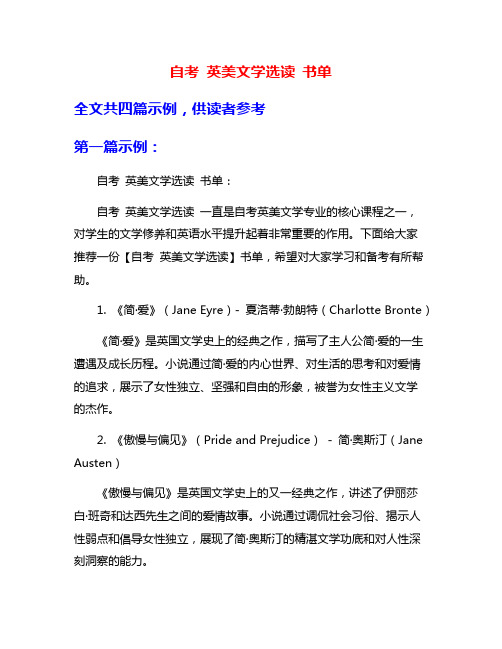
自考英美文学选读书单全文共四篇示例,供读者参考第一篇示例:自考英美文学选读书单:自考英美文学选读一直是自考英美文学专业的核心课程之一,对学生的文学修养和英语水平提升起着非常重要的作用。
下面给大家推荐一份【自考英美文学选读】书单,希望对大家学习和备考有所帮助。
1. 《简·爱》(Jane Eyre)- 夏洛蒂·勃朗特(Charlotte Bronte)《简·爱》是英国文学史上的经典之作,描写了主人公简·爱的一生遭遇及成长历程。
小说通过简·爱的内心世界、对生活的思考和对爱情的追求,展示了女性独立、坚强和自由的形象,被誉为女性主义文学的杰作。
2. 《傲慢与偏见》(Pride and Prejudice)- 简·奥斯汀(Jane Austen)《傲慢与偏见》是英国文学史上的又一经典之作,讲述了伊丽莎白·班奇和达西先生之间的爱情故事。
小说通过调侃社会习俗、揭示人性弱点和倡导女性独立,展现了简·奥斯汀的精湛文学功底和对人性深刻洞察的能力。
3. 《了不起的盖茨比》(The Great Gatsby)- F·司各特·菲茨杰拉德(F. Scott Fitzgerald)《了不起的盖茨比》是美国文学史上的代表作之一,讲述了上世纪20年代美国高盛时期的繁荣与荒诞。
小说通过主人公盖茨比的爱情故事、社会地位和金钱的探讨,揭示了美国梦的虚幻和人性的贪婪,具有较高的文学价值和社会意义。
《呼啸山庄》是英国文学史上的经典之作,描绘了希斯克利夫和凯瑟琳之间的爱恨纠葛。
小说通过家族恩怨、爱情悲剧和人性探讨,展现了勃朗特姐妹的文学才华和对人性矛盾的深刻理解。
《去吧,告诉她们,我在这里》是美国文学史上的力作之一,讲述了黑人青年约翰尼的成长经历和对信仰的追求。
小说通过种族歧视、家庭纠葛和自我认同的挣扎,反映了美国社会的种族问题和对人类命运的深刻思考。
英语自考《英美文学选读》的资料

一莎士比亚In 1593 and 1594, he published two narrative poems(叙事诗), Venus and Adonis(维纳斯和安东尼斯) and The Rape of Lucrece(鲁克丽斯受辱记).Four period:First: The first period of Shakespeare's dramatic career was one of apprenticeship(学徒期). He wrote five history plays: Henry VI, Parts I, II, and III(亨利六世上,中,下),Richard III(理查三世), and Titus Andronicus(泰托斯.安东尼); and four comedies: The Comedy of Errors(错误的喜剧), The Two Gentlemen of Verona(维洛那二绅士), The Taming of the Shrew(训悍记), and Love's Labour's Lost(爱的徒劳).Second: In the second period, Shakespeare's style and approach became highly individualized. By constructing a complex pattern between different characters and between appearance and reality, Shakespeare made subtle comments on a variety of human foibles. In this period he wrote five histories: Richard II(理查二世), King John(约翰王), Henry IV, Parts I and II(亨利四世上部和下部), and Henry V(亨利五世); six comedies: A Midsummer Night's Dream(仲夏夜之梦), The Merchant of Venice(威尼斯商人),Much Ado About Nothing(无事生非), As You Like It(皆大欢喜), Twelfth Night(第十二夜), and The Merry Wives of Windsor(温莎的风流娘们儿); and two tragedies: Romeo and Juliet(罗密欧与朱丽叶) and Julis Caesar(裘里斯.凯撒).Third: Shakespeare's third period includes his greatest tragedies and his so-called dark comedies. The tragedies of this period are Hamlet(哈姆雷特), Othello(奥赛罗), King Lear(李尔王), Macbeth(麦克白), Angony and Cleopatra(安东尼与克利奥佩特拉), Troilus and Cressida(克利奥拉纳斯), and Coriolanus(). The two comedies are All's Well That Ends Wells(终成眷属)and Measure for Measure(一报还一报).Last: The last period of Shakespeare's work includes his principal romantic tragicomedies(浪漫悲喜剧): Pericles(伯利克里), Cymbeline(辛白林), The Winter's Tale(冬天的故事) and The Tempest(暴风雨); and his two final plays: Henry VIII(亨利八世) and The Two Noble Kinsmen(两位贵族亲戚).Shakespeare's authentic non-dramatic poetry consist of two long narrative poems: Venus and Adonis(维纳斯和安东尼斯) and The Rape of Lucrece(鲁克丽斯受辱记), and his sequence of 154 sonnets. Shakespeare's sonnets are the only direct expression of the poet's own feelings.With three exceptions (99,126,154) Shakespeare writes his sonnets in the popular English form, first fully developed by Surrey, of three quatrains and a couplet(三节四行诗加一节偶句).Shakespeare's history plays are mainly written under the principle that national unity under a mighty and just sovereign is a necessity(在一个强大英明的君主统治下的国家,统一是非常必要的).The three history plays on the reign of Henry VI are the beginning of Shakespeare's epic treatment.The first and second parts of Henry IV are undoubtedly the most widely read among his history plays. It reveals a troubled reign in the 15th century. Shakespeare presents the patriotic spirit when mourning over the loss of English territories in France. He also dramatizes the class struggle between the oppressors and the oppressored during Jack Cade's rising of 1450. Furthermore, he condemns the War of the Roses waged by the feudal barons in which innocent people were killed. Here Shakespeare has liberated himself from any imitations of the contempory example .In his romantic comedies, Shakespeare takes an optimistic attitude toward love and youth, and the romantic elements are brought into full play.(在他的浪漫喜剧中,莎士比亚以乐观的态度对待爱情与青春,并将流浪色彩渲染到极致。
00604自考英美文学选读-串讲课件讲义

4*4’英国2218’B1分)C2A1分)2>1—2分)3>2—3分)4>1—2分)5>3—4分)1>时间+来源(0.5分—1分)3>2—3分)4> 1分)5>0.5—1分)6>0.5—1分)3>1—2分)4>2—3分)5>1—2分)6>0.5—1分)介绍论述题中关于作1>0.5—1分)2>1—2分)1>0.5—1分)2>1—2分)literary trend1798-1832Lyrical Ballads in 1798Walter Scott's death in 1832.is a literary trend.It prevailed in(place)during the period of xxxx-xxxx,beginning with xxxx in (time),ending with in(time).was greatly influenced by the.Generally speaking, the expressed the ideology and sentiment of those classes......The great writers in this period are............时期th to mid-17th )时期 1.<<>>2.3.1.2. 1.2.3.pun 3.英国文学 1.2.3.1.英国小说之父the father of English Novels2.讽刺satire1.2.3. 1.2.details细腻英国文学Period Period1836-1901 1.2.3.T ·S4.1.2.critical realist 3.4.3.4.5. 1.2.1.2.1.2.3.4.5.6.现实Period 美国文学1.2.3.4.5.老人与海6.现代Period1.2.3.4.浪漫Period1.Old English Literature-(450——1066封建建立)a. Religious-——b. Secular--heroic age---<Beowulf>盎格鲁撒克逊人的史诗---a protector of people, fight against the nature.————•••例题例题【正确答案:B】Background:a by a①The of&②The new in&the&本质与主张③The in&to get rid of to new ideas that the the&to the of the early from theEngland①---②都铎)Traits of humanistic poetry: dramatistsWriters:1.早期---andPetrarchan)2.中期the Ageblank verse)3.后期抽象founder of modern science)Life381542I.5 history plays and 4 comedies. (apprenticeship 学徒时期)•5•III>;and.•4部.•,II. 5 history plays ,6 comedies and 2 tragedies (style became highly individualized)•5II>,I,II,V>•6()••to•and•and loyal•其他•II. 5 history plays ,6 comedies and 2 tragedies (style became highly individualized) 2III. The Third stage---peak of his creation, included his greatest tragedies and his so-called dark comedies: ---Greatest four tragedies:<Hamlet><King Lear><Othello><Macbeth>III. The Third stage---peak of his creation, included his greatest tragedies and his so-called dark comedies:---Theme: The impossibility of certainty; the complexity of action;the mystery of death;the nation as a diseased body.blood-and-thunderand butIV. Principal Romantic tragicomedies: <The Tempest>①.②forth byto the one he人物塑造独白情节结构语言风格Paradise Lost<Lycidas挽歌<Areopagitica><Paradise LostThe is the“Fall of Man”.流放<Paradise Regained诱惑<Samson Agonistes>①②③④⑤例题例题【正确答案:B】background:Time:Background:Traits:Thoughts:节俭迷信EnlightmentLiterature ideas:教导.<A Modest ProposalLiterature ideas:Schools of literature:Daniel Defoe, Samuel Richardson, Henry Fielding, Laurence Sterne, Tobias George Smollett, and Oliver Goldsmith.2.Gothic novels ⋯⋯⋯Schools of literature:Daniel DefoeThe True born Englishman wonThe Review<Robinson Crusoe>②③坚韧④the lower-class people.选读<Robinson Crusoe> Theme:①②③创作风格:①②③方言。
新大纲自考《英美文学选读》笔记总结-背完必过

新大纲自考《英美文学选读》笔记总结-背完必过(总65页)--本页仅作为文档封面,使用时请直接删除即可----内页可以根据需求调整合适字体及大小--《英美文学选读》笔记背完必过Part One: English LiteratureAn Introduction to Old and Medieval English LiteratureI Understanding and application: (理解应用)1. England’s inhabitants are Celts. And it is conquered by Romans, Anglo Saxons and Normans. The Anglo-Saxons brought the Germanic language and culture to England, while Normans brought the Mediterranean civilization, including Greek culture, Rome law and the Christian religion. It is the cultural influence of these two conquests that provided the source for the rise and growth of English literature.2. The old English literature extends from about 450 to 1066, the year of the Norman conquest of England.3. The old English poetry that has survived can be divided into two groups: The religious group and the secular one4. Beowulf: a typical example of Old English poetry is regarded as the national epic of the Anglo-Saxons. It is an example of the mingling of nature myths and heroic legends.5. After the Norman’s conquest, three languages co-existed in England. French is the official language that is used by king and the Norman lords. Latin is the principal tongue of church affairs and in universities. Old English was spoken only by the common English people.6. In the second half of 14th century, English literature started to flourish with the appearance of writers like Geoffrey Chaucer, William Langland, John Gower, and othersII Recite: (识记再现)1. Romance:①It uses narrative verse or prose to sing knightly adventures or other heroic deeds is a popular literary form in the medieval period.②It has developed the characteristic medieval motifs of the quest, the test, the meeting with the evil giant and the encounter with the beautiful beloved.③The hero is usually the knight, who sets out on a journey to accomplish some missions. There are often mysteries and fantasies in romance.④Romantic love is an important part of the plot in romance.Characterization is standardized, While the structure is loose and episodic, the language is simple and straightforward.⑤The importance of the romance itself can be seen as a means of showing medieval aristocratic men and women in relation to their idealized view of the world.2. Heroic couplet:Heroic couplet is a rhymed couplet of iambic pentameter. It is Chaucer who used it for the first time in English in his work The Legend of Good Woman.3. The theme of Beowulf:The poem presents a vivid picture of how the primitive people wage heroic struggles against the hostile forces of the natural world under a wise and mighty leader. The poem is an example of the mingling of the nature myths and heroic legends.4. The Wife of Bath in The Canterbury Tales:The Wife of Bath is depicted as the new bourgeois wife asserting her independence. Chaucer develops his characterization to a higher artistic level by presenting characters with both typical qualities and individual dispositions.5. Chaucer’s achievement:①He presented a comprehensive realistic picture of his age and created a whole gallery of vivid characters in his works, especially in The Canterbury Tales.②He anticipated a new ear, the Renaissance, to come under the influence of the Italian writers.③He developed his characterization to a higher level by presenting characters with both typical qualities and individual dispositions.④He greatly contributed to the maturing of English poetry. Today, Chaucer’s reputation has beensecurely established as one of the best English poets for his wisdom, humor and humanity.6. “The F ather of English poetry”:Originally, Old English poems are mainly alliterative verses with few variations.①Chaucer introduced from France the rhymed stanzas of various types to English poetry to replace it.②In The Romaunt of the Rose (玫瑰传奇), he first introduced to the English the octosyllabic couplet (八音节对偶句).③In The Legend of Good Women, he used for the first time in English heroic couplet.④And in his masterpiece, The Canterbury Tales, he employed heroic couplet with true ease and charmfor the first time in the history of English literature.⑤His art made him one of the greatest poets in English; John Dryden called him “the father of Englishpoetry”.【例题】The work that presented, for the first time in English literature, a comprehensive realistic picture of the medieval English society and created a whole gallery of vivid characters from all walks of life is most likely ______________. (0704)A. William Langland’s Piers PlowmanB. Geoffrey Chaucer’s The Canterbury TalesC. John Gower’s Confession AmantisD. Sir Gawain and the Green Knight【答案】B【解析】本题考查的是中世纪时期几位诗人作品的创作主题和创作范围。
英美文学选读自学考试大纲

英美文学选读自学考试大纲一、考试简介英美文学选读自学考试旨在测试考生对于英美文学的基本概念、发展历程、重要作家及其作品的掌握程度,以及对于英美文学的基本理论和分析方法的了解和运用能力。
考试形式为闭卷笔试,考试时间为180分钟,满分为100分。
二、考试内容1、英美文学基本概念及发展历程(20%)测试考生对于英美文学的基本概念、发展历程和重要时期的了解和掌握程度。
2、英美文学重要作家及其作品(30%)测试考生对于英美文学的重要作家及其代表作品的了解和掌握程度,包括但不限于莎士比亚、简·奥斯汀、托尔斯泰、海明威等。
3、英美文学的基本理论和分析方法(30%)测试考生对于英美文学的基本理论和分析方法的了解和掌握程度,包括但不限于新批评、结构主义、后现代主义等。
4、阅读理解与写作能力(20%)测试考生的阅读理解能力和写作能力,包括对于所给文本的理解、分析、评价和论述能力。
三、考试形式及题型1、单项选择题(20分)要求考生从四个选项中选择一个最符合题意的答案。
2、多项选择题(20分)要求考生从五个选项中选择两个或以上的答案。
21、简答题(20分)要求考生用简短的语言回答问题,考查考生的理解和概括能力。
211、分析题(30分)要求考生对所给的文学作品进行分析、评价和论述,考查考生的分析能力和语言表达能力。
2111、写作题(10分)要求考生根据给定的题目和要求进行写作,考查考生的写作能力和语言表达能力。
四、自学建议系统学习英美文学基本知识:了解英美文学的发展历程、重要时期和流派,掌握基本概念和理论。
阅读重要作家作品:选择一些经典作家及其代表作品进行阅读和研究,深入了解作家的创作风格和思想内涵。
培养阅读和分析能力:通过阅读和分析文学作品,提高自己的阅读能力和分析能力,掌握基本的文学分析方法。
加强写作训练:通过写作练习,提高自己的写作能力和语言表达能力,为考试做好准备。
英美文学选读复习资料一、英国文学1、文艺复兴时期:代表人物:莎士比亚、培根、哈姆雷特等。
自考英语本科 英美文学选读 考试大纲
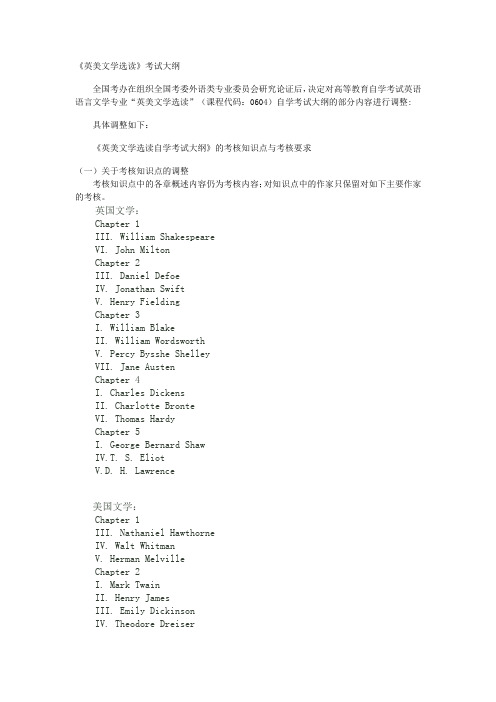
《英美文学选读》考试大纲全国考办在组织全国考委外语类专业委员会研究论证后,决定对高等教育自学考试英语语言文学专业“英美文学选读”(课程代码:0604)自学考试大纲的部分内容进行调整:具体调整如下:《英美文学选读自学考试大纲》的考核知识点与考核要求(一)关于考核知识点的调整考核知识点中的各章概述内容仍为考核内容;对知识点中的作家只保留对如下主要作家的考核。
英国文学:Chapter 1III. William ShakespeareVI. John MiltonChapter 2III. Daniel DefoeIV. Jonathan SwiftV. Henry FieldingChapter 3I. William BlakeII. William WordsworthV. Percy Bysshe ShelleyVII. Jane AustenChapter 4I. Charles DickensII. Charlotte BronteVI. Thomas HardyChapter 5I. George Bernard ShawIV.T. S. EliotV.D. H. Lawrence美国文学:Chapter 1III. Nathaniel HawthorneIV. Walt WhitmanV. Herman MelvilleChapter 2I. Mark TwainII. Henry JamesIII. Emily DickinsonIV. Theodore DreiserChapter 3II. Robert Lee FrostIV.F. Scott FitzgeraldV. Ernest HemingwayVI. William Faulkner二、关于考核要求的调整考核要求中每章概述内容不作调整:“该时期的重要作家”只包含对考核知识点中保留的重要作家的相关内容的考核原大纲如下:上篇英国文学第一章文艺复兴时期一、学习目的和要求通过本章的学习,了解文艺复兴运动和人文主义思潮产生的历史、文化背景,认识该时期文学创作的基本特征和基本主张,及其对同时代及其对同时代及后世英国文学乃至文化的影响;了解该时期重要作家的文学生涯、创作思想、艺术特色及其代表作品的主题结构、人物刻画、评议风格、思想意义等;同时结合注释,读懂所选作品,了解其思想内容和写作特色,培养理解和欣赏文学作品的能力。
(完整word版)新大纲自考《英美文学选读》笔记总结背完必过
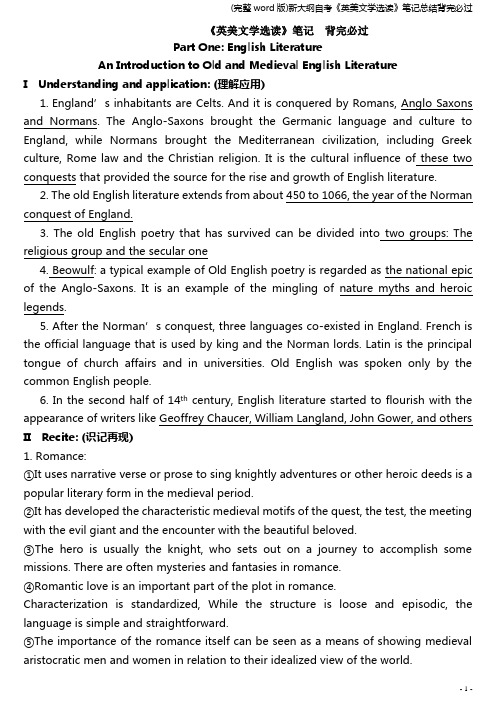
《英美文学选读》笔记背完必过Part One: English LiteratureAn Introduction to Old and Medieval English LiteratureI Understanding and application: (理解应用)1. England’s inhabitants are Celts. And it is conquered by Romans, Anglo Saxons and Normans. The Anglo-Saxons brought the Germanic language and culture to England, while Normans brought the Mediterranean civilization, including Greek culture, Rome law and the Christian religion. It is the cultural influence of these two conquests that provided the source for the rise and growth of English literature.2. The old English literature extends from about 450 to 1066, the year of the Norman conquest of England.3. The old English poetry that has survived can be divided into two groups: The religious group and the secular one4. Beowulf: a typical example of Old English poetry is regarded as the national epic of the Anglo-Saxons. It is an example of the mingling of nature myths and heroic legends.5. After the Norman’s conquest, three languages co-existed in England. French is the official language that is used by king and the Norman lords. Latin is the principal tongue of church affairs and in universities. Old English was spoken only by the common English people.6. In the second half of 14th century, English literature started to flourish with the appearance of writers like Geoffrey Chaucer, William Langland, John Gower, and others II Recite: (识记再现)1. Romance:①It uses narrative verse or prose to sing knightly adventures or other heroic deeds is a popular literary form in the medieval period.②It has developed the characteristic medieval motifs of the quest, the test, the meeting with the evil giant and the encounter with the beautiful beloved.③The hero is usually the knight, who sets out on a journey to accomplish some missions. There are often mysteries and fantasies in romance.④Romantic love is an important part of the plot in romance.Characterization is standardized, While the structure is loose and episodic, the language is simple and straightforward.⑤The importance of the romance itself can be seen as a means of showing medieval aristocratic men and women in relation to their idealized view of the world.2. Heroic couplet:Heroic couplet is a rhymed couplet of iambic pentameter. It is Chaucer who used it for the first time in English in his work The Legend of Good Woman.3. The theme of Beowulf:The poem presents a vivid picture of how the primitive people wage heroic struggles against the hostile forces of the natural world under a wise and mighty leader. The poem is an example of the mingling of the nature myths and heroic legends.4. The Wife of Bath in The Canterbury Tales:The Wife of Bath is depicted as the new bourgeois wife asserting her independence. Chaucer develops his characterization to a higher artistic level by presenting characters with both typical qualities and individual dispositions.5. Chaucer’s achievement:①He presented a comprehensive realistic picture of his age and created a whole gallery of vivid characters in his works, especially in The Canterbury Tales.②He anticipated a new ear, the Renaissance, to come under the influence of the Italian writers.③He developed his characterization to a higher level by presenting characters with both typical qualities and individual dispositions.④He greatly contributed to the maturing of English poetry. Today, Chaucer’s reputation has been securely established as one of the best English poets for his wisdom, humor and humanity.6. “The F ather of English poetry”:Originally, Old English poems are mainly alliterative verses with few variations.①Chaucer introduced from France the rhymed stanzas of various types to English poetry to replace it.②In The Romaunt of the Rose (玫瑰传奇), he first introduced to the English the octosyllabic couplet (八音节对偶句).③In The Legend of Good Women, he used for the first time in English heroic couplet.④And in his masterpiece, The Canterbury Tales, he employed heroic couplet with true ease and charm for the first time in the history of English literature.⑤His art made him one of the greatest poets in English; John Dryden called him “the father of English poetry”.【例题】The work that presented, for the first time in English literature, a comprehensive realistic picture of the medieval English society and created awhole gallery of vivid characters from all walks of life is most likely ______________.(0704)A. William Langland’s Piers PlowmanB. Geoffrey Chaucer’s The Canterbury TalesC. John Gower’s Confession AmantisD. Sir Gawain and the Green Knight【答案】B【解析】(P4.para.2)本题考查的是中世纪时期几位诗人作品的创作主题和创作范围。
自考英语本科英美文学选读系统回顾梳理英国文学解读
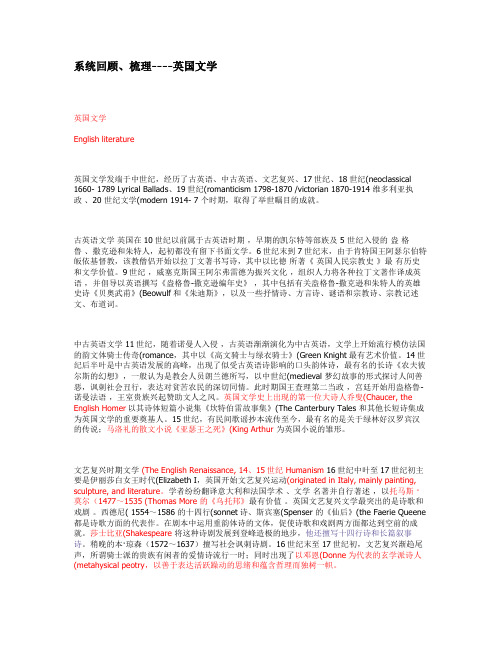
系统回顾、梳理----英国文学英国文学English literature英国文学发端于中世纪,经历了古英语、中古英语、文艺复兴、17世纪、18世纪(neoclassical 1660- 1789 Lyrical Ballads、19世纪(romanticism 1798-1870 /victorian 1870-1914 维多利亚执政、20 世纪文学(modern 1914- 7 个时期,取得了举世瞩目的成就。
古英语文学英国在10世纪以前属于古英语时期,早期的凯尔特等部族及 5 世纪入侵的盎格鲁、撒克逊和朱特人,起初都没有留下书面文学。
6世纪末到7世纪末,由于肯特国王阿瑟尔伯特皈依基督教,该教僧侣开始以拉丁文著书写诗,其中以比德所著《英国人民宗教史》最有历史和文学价值。
9世纪,威塞克斯国王阿尔弗雷德为振兴文化,组织人力将各种拉丁文著作译成英语,并倡导以英语撰写《盎格鲁-撒克逊编年史》,其中包括有关盎格鲁-撒克逊和朱特人的英雄史诗《贝奥武甫》(Beowulf和《朱迪斯》,以及一些抒情诗、方言诗、谜语和宗教诗、宗教记述文、布道词。
中古英语文学 11世纪,随着诺曼人入侵,古英语渐渐演化为中古英语,文学上开始流行模仿法国的韵文体骑士传奇(romance,其中以《高文骑士与绿衣骑士》(Green Knight最有艺术价值。
14世纪后半叶是中古英语发展的高峰,出现了似受古英语诗影响的口头韵体诗,最有名的长诗《农夫彼尔斯的幻想》,一般认为是教会人员朗兰德所写,以中世纪(medieval 梦幻故事的形式探讨人间善恶,讽刺社会丑行,表达对贫苦农民的深切同情。
此时期国王查理第二当政,宫廷开始用盎格鲁-诺曼法语,王室贵族兴起赞助文人之风。
英国文学史上出现的第一位大诗人乔叟(Chaucer, the English Homer以其诗体短篇小说集《坎特伯雷故事集》(The Canterbury Tales 和其他长短诗集成为英国文学的重要奠基人。
自考英美文学选读00604学习总结资料
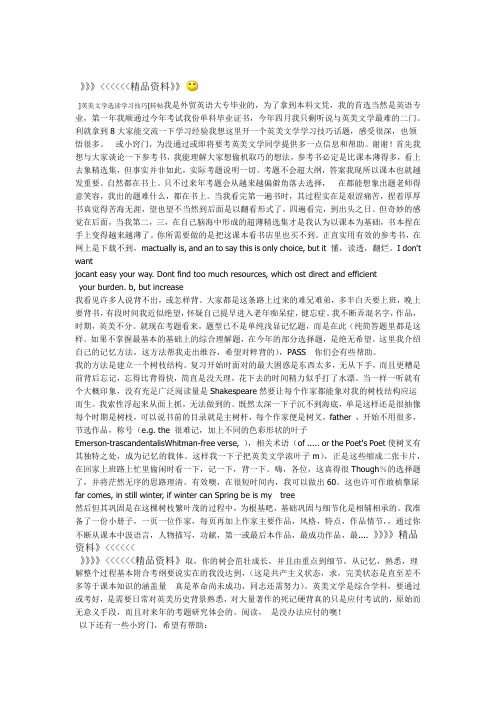
》》》<<<<<<精品资料》》]英美文学选读学习技巧[转帖我是外贸英语大专毕业的,为了拿到本科文凭,我的首选当然是英语专业,第一年我顺通过今年考试我份单科毕业证书,今年四月我只剩听说与英美文学最难的二门。
利就拿到8大家能交流一下学习经验我想这里开一个英美文学学习技巧话题,感受很深,也领悟很多。
或小窍门,为没通过或即将要考英美文学同学提供多一点信息和帮助。
谢谢!首先我想与大家谈论一下参考书,我能理解大家想偷机取巧的想法,参考书必定是比课本薄得多,看上去象精选集,但事实并非如此,实际考题说明一切。
考题不会超大纲,答案我现所以课本也就越发重要。
自然都在书上。
只不过来年考题会从越来越偏僻角落去选择,在都能想象出题老师得意笑容,我出的题难什么,都在书上。
当我看完第一遍书时,其过程实在是艰涩痛苦,捏着厚厚书真觉得苦海无涯,望也望不当然到后面是以翻看形式了,四遍看完,到出头之日。
但奇妙的感觉在后面,当我第二,三,在自己脑海中形成的超薄精选集才是我认为以课本为基础,书本捏在手上变得越来越薄了。
你所需要做的是把这课本看书店里也买不到。
正直实用有效的参考书,在网上是下载不到,mactually is, and an to say this is only choice, but it 懂,读透,翻烂。
I don't wantjocant easy your way. Dont find too much resources, which ost direct and efficientyour burden. b, but increase我看见许多人说背不出,或怎样背。
大家都是这条路上过来的难兄难弟,多半白天要上班,晚上要背书,有段时间我近似绝望,怀疑自己提早进入老年痴呆症,健忘症。
我不断弄混名字,作品,时期,英美不分。
就现在考题看来,题型已不是单纯浅显记忆题,而是在此(纯简答题里都是这样。
自考英语本科《英美文学选读》梳理----美国文学
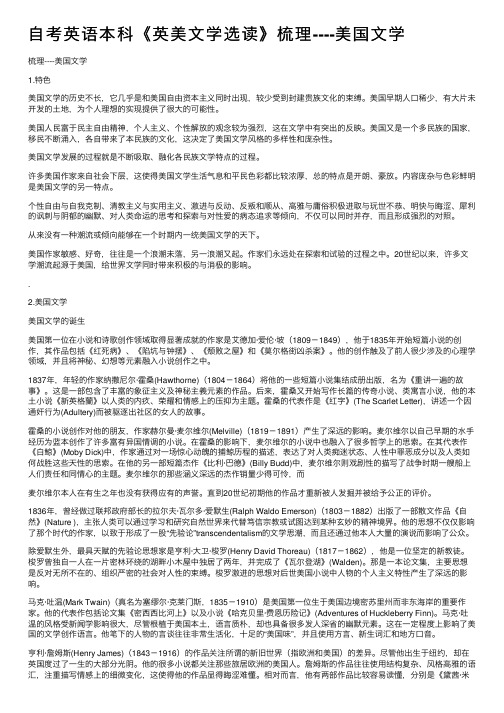
⾃考英语本科《英美⽂学选读》梳理----美国⽂学梳理----美国⽂学1.特⾊美国⽂学的历史不长,它⼏乎是和美国⾃由资本主义同时出现,较少受到封建贵族⽂化的束缚。
美国早期⼈⼝稀少,有⼤⽚未开发的⼟地,为个⼈理想的实现提供了很⼤的可能性。
美国⼈民富于民主⾃由精神,个⼈主义、个性解放的观念较为强烈,这在⽂学中有突出的反映。
美国⼜是⼀个多民族的国家,移民不断涌⼊,各⾃带来了本民族的⽂化,这决定了美国⽂学风格的多样性和庞杂性。
美国⽂学发展的过程就是不断吸取、融化各民族⽂学特点的过程。
许多美国作家来⾃社会下层,这使得美国⽂学⽣活⽓息和平民⾊彩都⽐较浓厚,总的特点是开朗、豪放。
内容庞杂与⾊彩鲜明是美国⽂学的另⼀特点。
个性⾃由与⾃我克制、清教主义与实⽤主义、激进与反动、反叛和顺从、⾼雅与庸俗积极进取与玩世不恭、明快与晦涩、犀利的讽刺与阴郁的幽默、对⼈类命运的思考和探索与对性爱的病态追求等倾向,不仅可以同时并存,⽽且形成强烈的对照。
从来没有⼀种潮流或倾向能够在⼀个时期内⼀统美国⽂学的天下。
美国作家敏感、好奇,往往是⼀个浪潮未落,另⼀浪潮⼜起。
作家们永远处在探索和试验的过程之中。
20世纪以来,许多⽂学潮流起源于美国,给世界⽂学同时带来积极的与消极的影响。
.2.美国⽂学美国⽂学的诞⽣美国第⼀位在⼩说和诗歌创作领域取得显著成就的作家是艾德加·爱伦·坡(1809-1849),他于1835年开始短篇⼩说的创作,其作品包括《红死病》、《陷坑与钟摆》、《颓败之屋》和《莫尔格街凶杀案》。
他的创作触及了前⼈很少涉及的⼼理学领域,并且将神秘、幻想等元素融⼊⼩说创作之中。
1837年,年轻的作家纳撒尼尔·霍桑(Hawthorne)(1804-1864)将他的⼀些短篇⼩说集结成册出版,名为《重讲⼀遍的故事》。
这是⼀部包含了丰富的象征主义及神秘主義元素的作品。
后来,霍桑⼜开始写作长篇的传奇⼩说、类寓⾔⼩说,他的本⼟⼩说《新英格蘭》以⼈类的内疚、荣耀和情感上的压抑为主题。
自考英美文学选读课件(超级完整版)

制作思维导图
利用思维导图工具将笔记内容可视化,形成 清晰的知识网络。
定期复习
定期回顾和复习笔记内容,加深记忆和理解; 同时不断补充和完善笔记。
08
课程总结与展望未来
课程重点内容回顾
01 文学流派与时期
本课程涵盖了从古典到现代的英美文学发展,重 点介绍了各个时期的代表性流派,如浪漫主义、 现实主义、现代主义等。
周完成一篇读书笔记等。
制定学习计划
根据学习目标,制定详细的学习计划, 包括学习时间、学习内容、学习方法 等。
监督与调整
定期检查学习进度,根据实际情况调 整学习计划,确保按计划执行。
如何提高阅读速度和效率
预览与预测
在阅读前预览文本,了解大致内容和结 构,预测可能涉及的主题和观点。
意群阅读
通过意群阅读,将单词组合成有意义 的短语或句子,提高阅读速度和理解
《傲慢与偏见》
通过贝内特家五个女儿的婚恋经历, 探讨婚姻与爱情的真谛。
《尤利西斯》
通过主人公布鲁姆一天的生活,表现 现代人的孤独与迷茫。
07
自学方法与技巧分享
如何制定自学计划并执行
确定学习目标
明确自考英美文学选读的学习目标, 包括掌握文学理论、了解文学流派、
熟悉重要作家作品等。
分解学习任务
将学习计划分解为可执行的小任务, 如每天阅读一定数量的文学作品、每
英美戏剧流派及特点
古典主义戏剧
以古希腊和古罗马戏 剧为典范,注重情节、 结构和语言的完美和 谐。
浪漫主义戏剧
强调情感、个性和自 然的表达,追求超越 现实的理想境界。
现实主义戏剧
关注现实生活和社会 问题,通过刻画典型 人物和环境来揭示社 会本质。
外国文学作品选自考专科
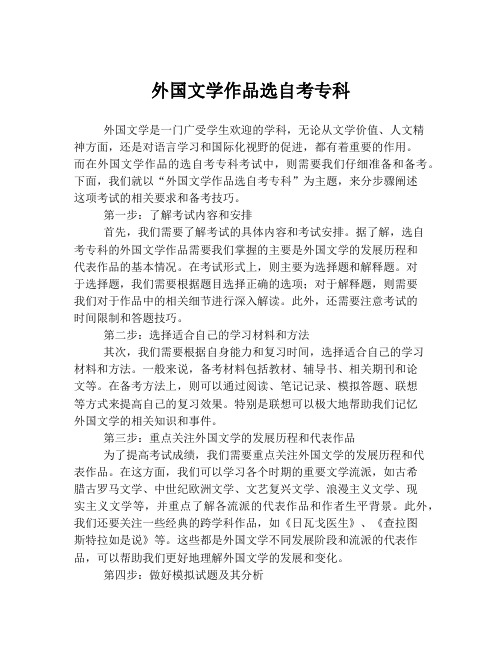
外国文学作品选自考专科外国文学是一门广受学生欢迎的学科,无论从文学价值、人文精神方面,还是对语言学习和国际化视野的促进,都有着重要的作用。
而在外国文学作品的选自考专科考试中,则需要我们仔细准备和备考。
下面,我们就以“外国文学作品选自考专科”为主题,来分步骤阐述这项考试的相关要求和备考技巧。
第一步:了解考试内容和安排首先,我们需要了解考试的具体内容和考试安排。
据了解,选自考专科的外国文学作品需要我们掌握的主要是外国文学的发展历程和代表作品的基本情况。
在考试形式上,则主要为选择题和解释题。
对于选择题,我们需要根据题目选择正确的选项;对于解释题,则需要我们对于作品中的相关细节进行深入解读。
此外,还需要注意考试的时间限制和答题技巧。
第二步:选择适合自己的学习材料和方法其次,我们需要根据自身能力和复习时间,选择适合自己的学习材料和方法。
一般来说,备考材料包括教材、辅导书、相关期刊和论文等。
在备考方法上,则可以通过阅读、笔记记录、模拟答题、联想等方式来提高自己的复习效果。
特别是联想可以极大地帮助我们记忆外国文学的相关知识和事件。
第三步:重点关注外国文学的发展历程和代表作品为了提高考试成绩,我们需要重点关注外国文学的发展历程和代表作品。
在这方面,我们可以学习各个时期的重要文学流派,如古希腊古罗马文学、中世纪欧洲文学、文艺复兴文学、浪漫主义文学、现实主义文学等,并重点了解各流派的代表作品和作者生平背景。
此外,我们还要关注一些经典的跨学科作品,如《日瓦戈医生》、《查拉图斯特拉如是说》等。
这些都是外国文学不同发展阶段和流派的代表作品,可以帮助我们更好地理解外国文学的发展和变化。
第四步:做好模拟试题及其分析最后,在备考时我们需要做好模拟试题及其分析。
模拟试题可以让我们更好地了解考试的难度和形式,同时帮助我们找到自己备考不足的地方。
在分析试题时,我们可以根据自己的答题时间和正确率,找出答错的地方和需要加强的知识点和技巧,从而调整备考重点。
教你“投机取巧”过自考英美文学

教你“投机取巧”过自考英美文学
英美文学这门科目庞大之极,堪称英本自考之最。
自己一个人看那幺厚的一本书,不用说能不能看下来,能记住多少实在不好说!
我在复习的时候,总结了一些规律,与大家分享,望对你有用,帮你顺利通过!
1.题型分析:一般来讲,肯定是这种类型:a.单项选择题(40道,40分)b. 引文简析(无非就是问问作者是谁,出自哪个作品,主题意象什幺的,4 道,16分)c.简答题(4 道,24分)d.论述题(无非就是分析加读后感,20分)
经验:你应该可以看出来了,重点当然是单选了,分数大,又好得分,实在不行还可以蒙。
建议尽可能把书看一遍,但不要看作者生平,那肯定不会考。
有个印象就可以了,不用去背,如果你汉语文学功底好,可以省去不少时间。
2.比例分析据本人统计,历年来英美文学的国考试卷中英国文学占52% ,美国文学占48%.(2003年4月例外,其中英国部分58% )其中,可以看出。
自考英美文学选读复习资料
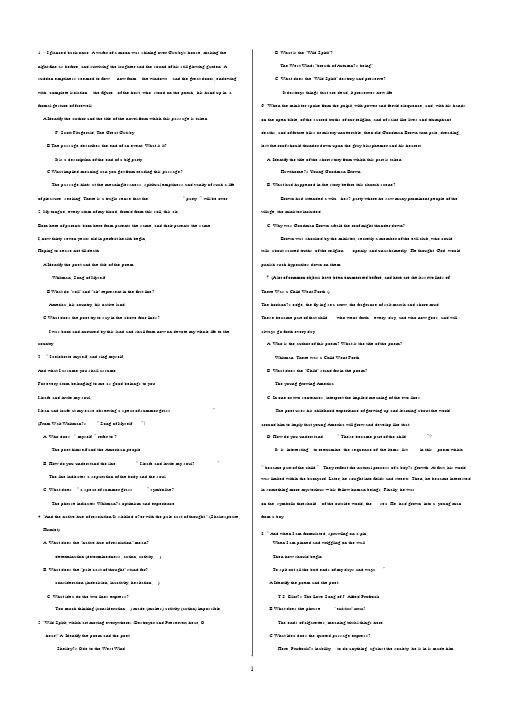
1. ⋯ I glanced back once. A wafer of a moon was shining over Gatsby's house, making thenight fine as before, and surviving the laughter and the sound of his still glowing garden. A sudden emptiness seemed to flow now from the windows and the great doors, endowing with complete isolation the figure of the host, who stood on the porch, his hand up in a formal gesture of farewell.A.Identify the author and the title of the novel from which this passage is taken.F. Scott Fitzgerald, The Great GatsbyB.The passage describes the end of an event. What is it?It is a description of the end of a big partyC.What implied meaning can you get from reading this passage?The passage hints at the meaninglessness, spiritual emptiness and vanity of such a lifeof pleasure- seeking. There is a tragic sense that the“ party” will be over.2. My tongue, every atom of my blood, form'd from this soil, this air,Born here of parents born here from parents the same, and their parents the same,I, now thirty-seven years old in perfect health begin,Hoping to cease not till death.A.Identify the poet and the title of the poem.Whitman, Song of MyselfB.What do "soil" and "air" represent in the first line?America, his country, his native landC.What does the poet try to say in the above four lines?I was born and nurtured by this land and shall from now on devote my whole life to the country.3.“ I celebrate myself, and sing myself,And what I assume you shall assume,For every atom belonging to me as good belongs to you.I loafe and invite my soul,I lean and loafe at my ease observing a spear of summer grass.”(From Walt Whitman?s“ Song of Myself”)A. Who does“ myself” refer to ?The poet himself and the American people.B. How do you understand the line“ I loafe and invite my soul?”The line indicates a separation of the body and the soul.C. What does“ a spear of summer grass” symbolize?The phrase indicates Whitman?s optimism and experience.4."And the native hue of resolution/Is sicklied o?er with the pale cast of thought." (Shakespeare,Humlet)A. What does the "native hue of resolution" mean?determination (determinedness, action, activity, ...)B. What does the "pale cast of thought" stand for?consideration (indecision, inactivity, hesitation, ...)C. What idea do the two lines express?Too much thinking (consideration,...) made (makes) activity (action) impossible. 5."Wild Spirit, which art moving everywhere; /Destroyer and Preserver; hear, Ohear!" A. Identify the poem and the poet.Shelley?s Ode to the West WindB. What is the "Wild Spirit"?The West Wind; "breath of Autumn?s being"C. What does the "Wild Spirit" destroy and preserve?It destroys things that are dead, it preserves new life.6."When the minister spoke from the pulpit, with power and fervid eloquence, and, with his hands on the open bible, of the sacred truths of our religion, and of saint-like lives and triumphant deaths, and of future bliss or misery unutterable, then did Goodman Brown turn pale, dreading,lest the roof should thunder down upon the gray blasphemer and his hearers.A. Identify the title of the short story from which this part is taken.Hawthorne?s Young Goodman BrownB. What had happened in the story before this church scene?Brown had attended a witc hes? party where he saw many prominent people of the village, the minister included.C. Why was Goodman Brown afraid the roof might thunder down?Brown was shocked by the minister, secretly a member of the evil club, who couldtalk about sacred truths of the religion openly and unashamedly. He thought God would punish such hypocrites down on them.7. (A lot of common objects have been enumerated before, and here are the last two lines ofThere Was a Child Went Forth :)The horizon?s edge, the fly ing sea-crow, the fragrance of salt marsh and shore mud.These became part of that child who went forth every day, and who now goes, and will always go forth every day.A. Who is the author of this poem? What is the title of the poem?Whitman. There was a Child Went ForthB. What does the "Child" stand for in the poem?The young growing America.C. In one or two sentences, interpret the implied meaning of the two lines.The poet uses his childhood experience of growing up and learning about the worldaround him to imply that young America will grow and develop like that.D. How do you understand“ These became part of the child”?It is interesting to reexamine the sequence of the items list in this poem which“ became part of the child ” . They reflect the natural process of a boy?s growth. At first, his world was limited within the barnyard. Later, he sought into fields and streets. Then, he became interested in something more mysterious — his fellow human beings. Finally, he wason the symbolic threshold of the outside world, the sea. He had grown into a young man from a boy.8.“ And when I am formulated, sprawling on a pin,When I am pinned and wriggling on the wall.Then how should beginTo spit out all the butt-ends of my days and ways . ”A.Identify the poem and the poet.T.S. Eliot?s The Love Song of J. Alfred Prufrock.B.What does the phrase“-endsbutt” mean?The ends of cigarettes, meaning trivial things here.C.What idea does the quoted passage express?Here, Prufrock?s inability to do anything against the society he is in is made himstrikingly clear by using a sharp comparison. Prufrock imagines himself as a kind of insect pinned on the wall and struggling in vain to get free. This image vividly shows Pru frock?s current predicament.9. “ I shall be telling this with a sighSomewhere ages and ages hence:Two roads diverged in a wood, and I—I took the one less traveled by,And that has made all the difference.”A.Idenfity the poem and the poet.Robert Lee Frost?s The Road Not Taken.B.What does the phrase“ ages and ages hence” mean?Many many years later.C.What idea does the quoted passage express?The speaker is telling his experience of making the choice of the roads. But he is conscious of the fact that his choice will have made all the difference in his life. He seems tobe giving a suggestion to the reader“ make good choice of your life”.D. What additional meaning do the two roads have?Life is here compared to a journey. The two roads stand for the choice one has to make at a critical moment in his life.E. What dilemma is the speaker facing?Since where the road leads to is uncertain, one has to wait to see the result of thechoice until one?s life is coming to an end. Then it will be too late. The speaker acknowledges the limits of life, yet he indulges himself in the notion that we could be really different from what we have become, because life is unpredictable.10.“ A violet by a mossy stoneHalf hidden from the eye!-Fair as a star, when only oneIs shining in the sky.”A. Identify the author and the title of the poem from which this stanza is taken.William Wordsworth,“ She Dwelt Among the Untrodden Ways”B. Pick out the metaphor used in this stanza.The flower (violet) is used as a metaphor.C. What quality does the author intend to show by using the metaphor?By comparing a country girl (Lucy) to a violet, the author intends to show her qualityof beauty and her virtues which are often neglected by the common people just like a wildflower blooming by an untrodden road.11.“ We passedThe School, where Childrenstrove At Recess - in the Ring -We passed The Fields of Gazing GrainWe passed The Setting Sun -”A. Who is the author and the poemEmily Dickinson“ Because I could not stop for Death-”B. What do the underlined parts symbolize?It stands for three stage of life:“ the school”-- youth,“ the Fieldsof GazingGrain ”— mature period,“ the setting sunend of life”—C. Where we re“ we” heading toward?“ We” are riding in a carriage, heading towards Eternity.D.What figure of speech is used in the poem?SymbolismE. What are Dicki nson?s unique writing features in relation to the quoted lines?Dashes are used as a musical device to create cadence and capital letters as a meansof emphasis.12.“ Never did sun more beautifullysteep In his first splendor, valley, rock, or hill;Ne?er saw I, never felt, a calm so deep! Theriver glideth at his own sweet will:Dear God! The very houses seem asleep;And all that mighty heart is lying still!”(William Wordsworth?s sonnet:“ Composed upon Westminster Bridge” September 3, 1802) Questions:A. What does the word“ glideth” in the fourth line mean?The word“ glideth” means“ flows”B. What kind of figure of speech is used by wordsworth to describe the“ river”?Wordsworth uses personification to describe the“ river”.C. What idea does the fourth line express?The 4th line expresses the idea that the river is flowing happily as a living things,which implies the beauty of the nature.D. What does this sonnet describe?It describes a vivid picture of a beautiful morning in London.E. What does the word“ mighty heart” refer to?LondonF. The sonnet follows strictly the Italian form. What is the feature of the Italian form ofsonnet?It follows strictly the Italian form, with a clear division between the octave and the sestet, the rhyme scheme is abbaabba, cdcdcd..13.“ The river glideth at his own sweet will:Dear God! the very houses seem asleep ;And all that mighty heart is lying still!”(from William Wordsworth?s“ Composed upon Westminster Bridge”)A. What figure of speech is used in the quoted lines?Italian formB. What does“ that mighty heart?? refer to?LondonC. What does the poem describe? —It describes a vivid picture of a beautiful morning in London14.“ With Blue uncertain—stumbling Buzz—Between the light — and me —And then the Windows failed—and thenI could not see to see —”A. Identify the poem and the poet.I heard a Fly buzz-when I died by Emily Dickinson.B. What do“ Windows” symbolically stand for?Eyes, for they are considered as the window of human soul. .C. What idea does the quoted passage express?The last thing the dying person saw and heard was the flying and its buzz. When theeyes failed, the human soul was closed and the person died. (The speaker could not see anyof the afterlife or God or angels she expected to see.)15.“ ,Is dying hard, Daddy??,No, I think it?s pretty easy, Nick, It all depends.”?A. Identify the work and the author.Earnest Hemingway, Indian CampB. What was Nick preoccupied with when he asked the question?Nick was preoccupied with the pain and the violence of death./life and deathC. Why di d the father add“ It all depends” after he answered his son?s question?By adding “ Itall depends ”the father meant that death means differently to different people. To such weak persons like the husband of the Indian woman it?s a pretty easy, while strong-willed person will not easily commit suicide.16.“ ,Faith! Faith!?cried the husband. ,Look up to Heaven, and resist the Wicked One.?A.Identify the work and the author.Hawthorne, Young Goodman BrownB.What idea does the quoted sentence express?Goodman Brown here is obviously addressing the image of his wife, urging her to resist the devil. At the same time he is exhorting himself to have faith, to look heavenward,to withstand the infernal eloquence of the Wicked one.17.“ Not on thy sole, but on thy soul, harsh Jew,Thou mak?st thy knife keen; but no metal can,No, not the hangman?s axe, bear half the keennessOf thy sharp envy.”A. Identify the author and the title of the play from which this part is taken.William Shakespeare, The Merchant of Venice.B. What figure of speech is used in this quoted passage?PunC. What idea does the passage express?18.“ The woods are lovely, dark and deep,But I have promises to keep,And miles to go before I sleep,And miles to go before I sleep.”A. Identify the poem and the poet.Robert Lee Frost, Stopping by Woods on a Snowy EveningB. What does the word“ sleep” mean?dieC. What idea do the four lines express?When facing the still and lovely forest, the speaker cannot stay, because of his obligation and responsibilities.19.“ Not lose possession of that fair thou ow?st:Nor shall Death brag thou wander?st in his shade,When in eternal lines to time thou grow?st; So long as men can breathe, or eyes can see,So long lives this, and this gives life to thee.”A. Identify the author and the title of the poem.Shakespeare?s Sonnet 18B. What does the word“ this” in the last line refer to?“ This ” refers to the poem.C.What idea do the quoted lines express?When you are in my eternal poetry, you are even with time. A nice summer?s day is usually transient, but the beauty in poetry can last forever.20 .“ Shall I compare thee to a summer?s day?Thou art more lovely and more temperate:Rough winds do shake the darling buds of May,And summer?s lease hath all too short a date:”A . Identify the poet and the poem from which the quoted lines are taken.Shakespeare?s Sonnet 18B. Name” the figure of speech employed in the poem.PersonificationC. What is the theme of the poem?A nice su mmer?s day is usually transient, but the beauty in poetry can last for ever.21.“⋯ only Miss Emily?s house was left, lifting its stubborn and coquettish decay above thecotton wagons and the gasoline pumps — an eyesore among eyesores.”A. Identify the author and the work.William Faulkner?s A Rose for Emily.B. What is the meaning of“ an eyesore among eyesores”?The meaning of“ an eyesore among eyesores” is the most unpleasant thing to look at.C.What does this quoted passage indicate?The house is a perfect mirror image of the owner who is stubborn and coquettish and deliberately detaches herself from the communal life in this small town.22.“ To be, or not to be that is —the question;Whether? tis nobler in the mind to sufferThe slings and arrows of outrageous fortune,Or to take arms against a sea of troubles,And by opposing end them?”A. Identify the author and the title of the passage from which this part is taken.William Shakespeare, HamletB. Explain the meaning of“ To be, or not to be”To live on in this world or to die, to suffer or to take action.C. How you understand the last lines?To take up arms against troubles that sweep upon us like a sea.23 .“ For oft, when on my couch I lieIn vacant or in pensive mood,they flash upo n that inward eye”A. Identify the author and the title.William Wordsworth, I wandered Lonely as a CloudB. What does the phrase“ inward eye” mean?Human soulC. Write out the main idea of the passage in plain English.The poet expressed his love for the daffodils.24.“ Therewas music from my neighbor?s house through the summer nights. In his blue gardens men and girls came and went like moths among the whisperings and the champagne and the stars. At high tide in the afternoon I watched his guests diving from the tower of hisraft, or taking the sun on the hot sand of his beach while his two motor — boats slit the waters of the Sound, drawing aquaplanes over cataracts of foam.On week — ends his Rolls — Royce became an omnibus, bearing parties to and from the city between nine in the morning and long past midnight, while his station wagon scampered like a brisk yellow bugto meet all trains. And on Mondays eight servants, including an extra gardener, toiled all daywith mops and scrubbing—brushes and hammers and garden—shears, repairing the ravages of the night before.”A . Identify the author and the title of the novel from which this passage is taken.F. Scott Fitzgerald, The Great GatsbyB .What can you imply by reading this passage?It describes Gatsby ?s extravagance.C .What do the“ moths” symbolize?Moths are used metaphorically to refer to those people who are drawn to the party simply for its glamour, for the wealth of Gatsby.25.“ Do you think, because I am poor, obscur e, plain, and little, I am soulless and heartless?— You think wrong! ⋯ And if God had gifted me with some beauty, and much wealth, Ishould have made it as hard for you to leave me, as it is now for me to leave you it is my spirit that addresses your spirit; just as if both had passed through the grave, and we stood at God?s feet, equal—as we are!”A . Identify the author and the novel from which the quoted part is taken.Charlotte Bronte, Jane EyreB .To whom is the speaker speaking?Jane Eyre is speaking to Rochester.C .What does the quoted part imply about the speaker?Jane Eyre loves Rochester but she values her basic rights and equality as a human being.26.“ When the stars threw down their spears,And water?d heaven with their tears,Did he smile his work to see?Did he who made the Lamb make thee?”A. Identify the poet and the poem from which the quoted lines are taken—William Blake?s“ The Tyger”B. Whom does the“ he?? refer to?—the GodC. What does the“ Lamb” symbolize?—The “ Lamb” mbolsy of peace and purity.27.“ I cannot rub the strangeness from my sightI got from looking through a pane of glassI skimmed this morning from the drinking troughAnd held against the world of hoary grass.”A. Identify the poet and the poem from which the quoted lines are taken.—Robert Lee Frost, After Apple-PickingB.what do es the word“ strangeness?? refer to?—the“ essence of winter sleep????????”C. What do the quoted lines imply?⋯—。
自考英美文学选读复习资料
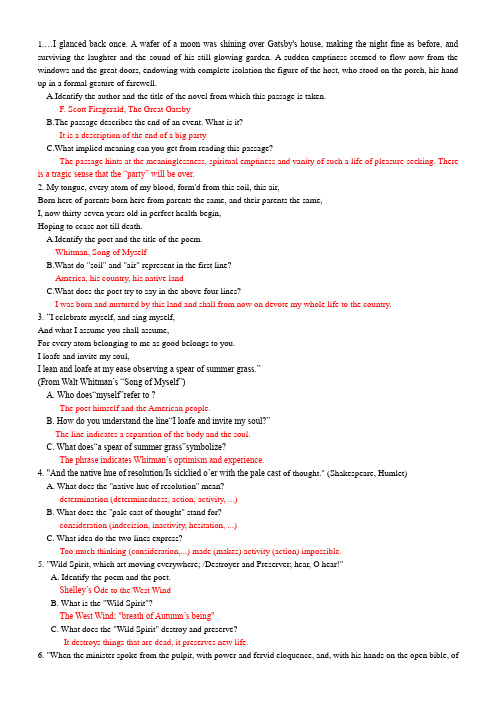
1.…I glanced back once. A wafer of a moon was shining over Gatsby's house, making the night fine as before, and surviving the laughter and the sound of his still glowing garden. A sudden emptiness seemed to flow now from the windows and the great doors, endowing with complete isolation the figure of the host, who stood on the porch, his hand up in a formal gesture of farewell.A.Identify the author and the title of the novel from which this passage is taken.F. Scott Fitzgerald, The Great GatsbyB.The passage describes the end of an event. What is it?It is a description of the end of a big partyC.What implied meaning can you get from reading this passage?The passage hints at the meaninglessness, spiritual emptiness and vanity of such a life of pleasure-seeking. There is a tragic sense that the “party” will be over.2. My tongue, every atom of my blood, form'd from this soil, this air,Born here of parents born here from parents the same, and their parents the same,I, now thirty-seven years old in perfect health begin,Hoping to cease not till death.A.Identify the poet and the title of the poem.Whitman, Song of MyselfB.What do "soil" and "air" represent in the first line?America, his country, his native landC.What does the poet try to say in the above four lines?I was born and nurtured by this land and shall from now on devote my whole life to the country.3. “I celebrate myself, and sing myself,And what I assume you shall assume,For every atom belonging to me as good belongs to you.I loafe and invite my soul,I lean and loafe at my ease observing a spear of summer grass.”(From Walt Whitman‟s “Song of Myself”)A. Who does“myself”refer to ?The poet himself and the American people.B. How do you understand the line“I loafe and invite my soul?”The line indicates a separation of the body and the soul.C. What does“a spear of summer grass”symbolize?The phrase indicates Whitman‟s optimism and experience.4. "And the native hue of resolution/Is sicklied o‟er with the pale cast of thought." (Shakespeare, Humlet)A. What does the "native hue of resolution" mean?determination (determinedness, action, activity, ...)B. What does the "pale cast of thought" stand for?consideration (indecision, inactivity, hesitation, ...)C. What idea do the two lines express?Too much thinking (consideration,...) made (makes) activity (action) impossible.5. "Wild Spirit, which art moving everywhere; /Destroyer and Preserver; hear, O hear!"A. Identify the poem and the poet.Shelley‟s O de to the West WindB. What is the "Wild Spirit"?The West Wind; "breath of Autumn‟s being"C. What does the "Wild Spirit" destroy and preserve?It destroys things that are dead, it preserves new life.6. "When the minister spoke from the pulpit, with power and fervid eloquence, and, with his hands on the open bible, ofthe sacred truths of our religion, and of saint-like lives and triumphant deaths, and of future bliss or misery unutterable, then did Goodman Brown turn pale, dreading, lest the roof should thunder down upon the gray blasphemer and his hearers.A. Identify the title of the short story from which this part is taken.Hawthorne‟s Young Goodman BrownB. What had happened in the story before this church scene?Brown had attended a witc hes‟ party where he saw many prominent people of the village, the minister included.C. Why was Goodman Brown afraid the roof might thunder down?Brown was shocked by the minister, secretly a member of the evil club, who could talk about sacred truths of the religion openly and unashamedly. He thought God would punish such hypocrites down on them.7. (A lot of common objects have been enumerated before, and here are the last two lines of There Was a Child Went Forth :)The horizon‟s edge, the fly ing sea-crow, the fragrance of salt marsh and shore mud.These became part of that child who went forth every day, and who now goes, and will always go forth every day.A. Who is the author of this poem? What is the title of the poem?Whitman. There was a Child Went ForthB. What does the "Child" stand for in the poem?The young growing America.C. In one or two sentences, interpret the implied meaning of the two lines.The poet uses his childhood experience of growing up and learning about the world around him to imply that young America will grow and develop like that.D. How do you understand “These became part of the child”?It is interesting to reexamine the sequence of the items list in this poem which “became part of the child”. They re flect the natural process of a boy‟s growth. At first, his world was limited within the barnyard. Later, he sought into fields and streets. Then, he became interested in something more mysterious—his fellow human beings. Finally, he was on the symbolic threshold of the outside world, the sea. He had grown into a young man from a boy.8.“And when I am formulated, sprawling on a pin,When I am pinned and wriggling on the wall.Then how should beginTo spit out all the butt-ends of my days and ways.”A.Identify the poem and the poet.T.S. Eliot‟s The Love Song of J. Alfred Prufrock.B.What does the phrase “butt-ends” mean?The ends of cigarettes, meaning trivial things here.C.What idea does the quoted passage express?He re, Prufrock‟s inability to do anything against the society he is in is made him strikingly clear by using a sharp comparison. Prufrock imagines himself as a kind of insect pinned on the wall and struggling in vain to get free. This image vividly shows Pru frock‟s current predicament.9.“I shall be telling this with a sighSomewhere ages and ages hence:Two roads diverged in a wood, and I—I took the one less traveled by,And that has made all the difference.”A.Idenfity the poem and the poet.Robert Lee Frost‟s The Road Not Taken.B.What does the phrase “ages and ages hence” mean?Many many years later.C.What idea does the quoted passage express?The speaker is telling his experience of making the choice of the roads. But he is conscious of the fact that his choice will have made all the difference in his life. He seems to be giving a suggestion to the reader “make good choice of your life”.D. What additional meaning do the two roads have?Life is here compared to a journey. The two roads stand for the choice one has to make at a critical moment in his life.E. What dilemma is the speaker facing?Since where the road leads to is uncertain, one has to wait to see the result of the choice until one‟s life is coming to an end. Then it will be too late. The speaker acknowledges the limits of life, yet he indulges himself in the notion that we could be really different from what we have become, because life is unpredictable.10. “A violet by a moss y stoneHalf hidden from the eye!-Fair as a star, when only oneIs shining in the sky.”A. Identify the author and the title of the poem from which this stanza is taken.William Wordsworth, “She Dwelt Among the U ntrodden Ways”B. Pick out the metaphor used in this stanza.The flower (violet) is used as a metaphor.C. What quality does the author intend to show by using the metaphor?By comparing a country girl (Lucy) to a violet, the author intends to show her quality of beauty and her virtues which are often neglected by the common people just like a wild flower blooming by an untrodden road.11. “We passed The School, where Children stroveAt Recess-in the Ring-We passed The Fields of Gazing GrainWe passed The Setting Sun-”A. Who is the author and the poemEmily Dickinson “Because I could not stop for Death-”B. What do the underlined parts symbolize?It stands for three stage of life: “the school” --youth, “the Fields of Gazing Grain”—mature period, “the setting sun”—end of lifeC. Where were “we” heading toward?“We” are riding in a carriage, heading towards Eternity.D. What figure of speech is used in the poem?SymbolismE. What are Dicki nson‟s unique writing features in relation to the quoted lines?Dashes are used as a musical device to create cadence and capital letters as a means of emphasis.12. “Never did sun more beautifully steepIn his first splendor, valley, rock, or hill;Ne‟er saw I, never felt, a calm so deep!The river glideth at his own sweet will:Dear God! The very houses seem asleep;And all that mighty heart is lying still!”(William Wordsworth‟s sonnet: “Composed upon Westminster Bridge” September 3, 1802)Questions:A. What does the word “glideth” in the fourth line mean?The word “glideth” means “flows”B. What kind of figure of speech is used by wordsworth to describe the “river”?Wordsworth uses personification to describe the “river”.C. What idea does the fourth line express?The 4th line expresses the idea that the river is flowing happily as a living things, which implies the beauty of the nature.D. What does this sonnet describe?It describes a vivid picture of a beautiful morning in London.E. What does the word “mighty heart” refer to?LondonF. The sonnet follows strictly the Italian form. What is the feature of the Italian form of sonnet?It follows strictly the Italian form, with a clear division between the octave and the sestet, the rhyme scheme is abbaabba, cdcdcd..13. “The river glideth at his own sweet will:Dear God! the very houses seem asleep;And all that mighty heart is lying still!”(from William Wordsworth‟s “Composed upon Westminster Bridge”)A. What figure of speech is used in the quoted lines?Italian formB. What does “that mighty heart‟‟ refer to?LondonC. What does the poem describe?—It describes a vivid picture of a beautiful morning in London14. “With Blue—uncertain stumbling Buzz—Between the light—and me—And then the Windows failed—and thenI could not see to see—”A. Identify the poem and the poet.I heard a Fly buzz-when I died by Emily Dickinson.B. What do “Windows” symbolically stand for?Eyes, for they are considered as the window of human soul. .C. What idea does the quoted passage express?The last thing the dying person saw and heard was the flying and its buzz. When the eyes failed, the human soul was closed and the person died. (The speaker could not see any of the afterlife or God or angels she expected to see.) 15. “…Is dying hard, Daddy?‟…No, I think it‟s pretty easy, Nick, It all depends.”‟A. Identify the work and the author.Earnest Hemingway, Indian CampB. What was Nick preoccupied with when he asked the question?Nick was preoccupied with the pain and the violence of death./life and deathC. Why did the father add “It all depends” after he answered his son‟s question?By adding “It all depends” the father meant that death means differently to diffe rent people. To such weak persons like the husband of the Indian woman it‟s a pretty easy, while strong-willed person will not easily commit suicide.16.“…Faith! Faith!‟cried the husband. …Look up to Heaven, and resist the Wicked One.‟”A.Identify the work and the author.Hawthorne, Young Goodman BrownB.What idea does the quoted sentence express?Goodman Brown here is obviously addressing the image of his wife, urging her to resist the devil. At the same time he is exhorting himself to have faith, to look heavenward, to withstand the infernal eloquence of the Wicked one.17.“Not on thy sole, but on thy soul, harsh Jew,Thou mak‟st thy knife keen; but no metal can,No, not the hangman‟s axe, bear half the keennessOf thy sharp envy.”A. Identify the author and the title of the play from which this part is taken.William Shakespeare, The Merchant of Venice.B. What figure of speech is used in this quoted passage?PunC. What idea does the passage express?18.“The woods are lovely, dark and deep,But I have promises to keep,And miles to go before I sleep,And miles to go before I sleep.”A. Identify the poem and the poet.Robert Lee Frost, Stopping by Woods on a Snowy EveningB. What does the word“sleep”mean?dieC. What idea do the four lines express?When facing the still and lovely forest, the speaker cannot stay, because of his obligation and responsibilities. 19. “Not lose possession of that fair thou ow‟st:Nor shall Death brag thou wander‟st in his shade,When in eternal lines to time thou grow‟st;So long as men can breathe, or eyes can see,So long lives this, and this gives life to thee.”A. Identify the author and the title of the poem.Shakespeare‟s Sonnet 18B. What does the word “this” in the last line refer to?“This” refer s to the poem.C. What idea do the quoted lines express?When you are in my eternal poetry, you are even with time. A nice summer‟s day is usually transient, but the beauty in poetry can last forever.20.“Shall I compare thee to a summer‟s day?Thou art more lovely and more temperate:Rough winds do shake the darling buds of May,And summer‟s lease hath all too short a date:”A.Identify the poet and the poem from which the quoted lines are taken.Shakespeare‟s Sonnet 18B.Name the figure of speech employed in the poem.PersonificationC.What is the theme of the poem?A nice summer‟s day is usually transient, but the beauty in poetry can last for ever.21. “…only Miss Emily‟s house was left, lifting its stubborn and coquettish deca y above the cotton wagons and the gasoline pumps—an eyesore among eyesores.”A. Identify the author and the work.William Faulkner‟s A Rose for Emily.B. What is the meaning of “an eyesore among eyesores”?The meaning of “an eyesore among eyesores” is the most unpleasant thing to look at.C.What does this quoted passage indicate?The house is a perfect mirror image of the owner who is stubborn and coquettish and deliberately detaches herselffrom the communal life in this small town.22. “To be, or not to be—that is the question;Whether‟ tis nobler in the mind to sufferThe slings and arrows of outrageous fortune,Or to take arms against a sea of troubles,And by opposing end them?”A. Identify the author and the title of the passage from which this part is taken.William Shakespeare, HamletB. Explain the meaning of “To be, or not to be”To live on in this world or to die, to suffer or to take action.C. How you understand the last lines?To take up arms against troubles that sweep upon us like a sea.23.“For oft, when on my couch I lieIn vacant or in pensive mood,they flash upon that inward eye”A.Identify the author and the title.William Wordsworth, I wandered Lonely as a CloudB.What does the phrase “inward eye” m ean?Human soulC.Write out the main idea of the passage in plain English.The poet expressed his love for the daffodils.24.“There was music from my neighbor‟s house through the summer nights. In his blue gardens men and girls came and went like moths among the whisperings and the champagne and the stars. At high tide in the afternoon I watched his guests diving from the tower of his raft, or taking the sun on the hot sand of his beach while his two motor—boats slit the waters of the Sound, drawing aquaplanes over cataracts of foam. On week—ends his Rolls—Royce became an omnibus, bearing parties to and from the city between nine in the morning and long past midnight, while his station wagon scampered like a brisk yellow bug to meet all trains. And on Mondays eight servants, including an extra gardener, toiled all day with mops and scrubbing—brushes and hammers and garden—shears, repairing the ravages of the night before.”A.Identify the author and the title of the novel from which this passage is taken.F. Scott Fitzgerald, The Great GatsbyB.What can you imply by reading this passage?It describes Gatsby‟s extravagance.C.What do the “moths ” symbolize?Moths are used metaphorically to refer to those people who are drawn to the party simply for its glamour, for the wealth of Gatsby.25.“Do you think, because I am poor, obscure, plain, and little, I am soulless and heartless? —You think wrong!… And if God had gifted me with some beauty, and much wealth, I should have made it as hard for you to leave me, as it is now for me to leave you…—it is my spirit that addresses your spirit; just as if both had passed through the grave, and we stood at God‟s feet, equal—as we are!”A.Identify the author and the novel from which the quoted part is taken.Charlotte Bronte, Jane EyreB.To whom is the speaker speaking?Jane Eyre is speaking to Rochester.C.What does the quoted part imply about the speaker?Jane Eyre loves Rochester but she values her basic rights and equality as a human being.26. “When the stars threw down their spears,And water‟d heaven with their tears,Did he smile his work to see?Did he who made the Lamb make thee?”A. Identify the poet and the poem from which the quoted lines are taken—William Blake‟s “The Tyger”B. Whom does the “he‟‟ refer to?—the GodC. What does the “Lamb” symbolize?—The “Lamb” symbol of peace and purity.27. “I cannot rub the strangeness from my sightI got from looking through a pane of glassI skimmed this morning from the drinking troughAnd held against the world of hoary grass.”A. Identify the poet and the poem from which the quoted lines are taken.—Robert Lee Frost, After Apple-PickingB.what do es the word “strangeness‟‟ refer to?—the “essence of winter sleep” ????????C. What do the quoted lines imply?。
自考英美文学选读要点总结精心整理

英美文学选读要点总结精心整理[英国』Chapter1 The Renaissance period(14世纪至十七世纪中叶)文艺复兴1. Humanism is the essence of the Renaissance.人文主义是文艺复兴的核心。
2. the Greek and Roman civilization was based on such a conception that man is the measure of all things.人文主义作为文艺复兴的起源是因为古希腊罗马文明的基础是以“人”为中心,人是万物之灵。
3. Renaissance humanists found in then classics a justification to exalt human nature and came to see that human beings were glorious creatures capable of individual development in the direction of perfection, and that the world they inhabited was theirs not to despise but to question, explore, and enjoy.人文主义者们却从古代文化遗产中找到充足的论据,来赞美人性,并开始注意到人类是崇高的生命,人可以不断发展完善自己,而且世界是属于他们的,供他们怀疑,探索以及享受。
4. Thomas More, Christopher Marlowe and William Shakespeare are the best representatives of the English humanists.托马斯.摩尔,克利斯朵夫.马洛和威廉.莎士比亚是英国人文主义的代表。
5. Wyatt introduced the Petrarchan sonnet into England.怀亚特将彼特拉克的十四行诗引进英国。
英美文学选读 自考笔记
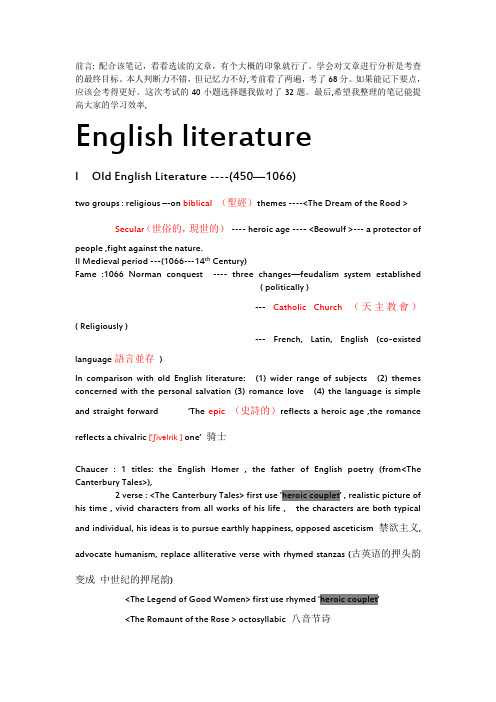
前言: 配合该笔记,看看选读的文章,有个大概的印象就行了。
学会对文章进行分析是考查的最终目标。
本人判断力不错,但记忆力不好,考前看了两遍,考了68分。
如果能记下要点,应该会考得更好。
这次考试的40小题选择题我做对了32题。
最后,希望我整理的笔记能提高大家的学习效率,English literatureI Old English Literature ----(450—1066)two groups : religious –-on biblical (聖經)themes ----<The Dream of the Rood >Secular(世俗的,現世的)---- heroic age ---- <Beowulf >--- a protector of people ,fight against the nature.II Medieval period ---(1066---14th Century)Fame :1066 Norman conquest ---- three changes—feudalism system established( politically )--- Catholic Church (天主教會)( Religiously )--- French, Latin, English (co-existed language語言並存)In comparison with old English literature: (1) wider range of subjects (2) themes concerned with the personal salvation (3) romance love (4) the language is simple and straight forward ‘The epic (史詩的)reflects a heroic age ,the romancereflects a chivalric['ʃivəlrik]one’ 骑士Chaucer : 1 titles: the English Homer , the father of English poetry (from<The Canterbury Tales>),2 verse : <The Canterbury Tales> first use 'heroic couplet' , realistic picture of his time , vivid characters from all works of his life , the characters are both typical and individual, his ideas is to pursue earthly happiness, opposed asceticism 禁欲主义,advocate humanism, replace alliterative verse with rhymed stanzas (古英语的押头韵变成中世纪的押尾韵)<The Legend of Good Women> first use rhymed 'heroic couplet'<The Romaunt of the Rose > octosyllabic 八音节诗3.novel: <Troilus and Criseyde> the first modern novel.III Renaissance (14th—17th)Fame : ① move from feudalist ideas to the interest of rising bourgeoisie.② recover from corruption of the Roman Catholic Church to the purity of the earthly church .England :the reign of Henry VIII -----England‘s Go lden Age in literature----- Bibles in English instead of Latin readable for common people -------- literary giants : Shakespeare ,Spenser ,Jonson Sidney, Marlowe ,Bacon ,and DonneThe time of Tudos ---- change monasteries修道院into schools and universities ------ the English Renaissance flourishing-------first introduced printing into England and translated books in English(by William Caxton)Traits of humanistic poetry : meter, rhyme, scheme, imagery and argument should be combined to frame the emotional theme. Poetry was to be a concentrated exercise of the mind , if craftsmanship and of learning.The most famous dramatists : Shakesperar , Ben Jonson, and MarloweWriters : Wyatt (introduced the Petrarchan sonnet into England)Surrey (brought in blank verse)Sidney (brought in sestina and terza rima)Marlowe(brought mighty lines to the blank verse )Spenser( pastoral convention )John Donne, George Herbert ( metaphysical poets)Francis Bacon(the first important English essayist, the founder of modern science in England)I Edmund SpensorFame: Spenserian Stanza,the poet’s poet(他的诗节被称为“斯宾塞诗节”,他被称为“诗人中之诗人”)选读<The Faerie Queene> (Poem)contains 12 books, speaks of 12 virtues of the private gentleman, each of which tells a knight. Arthur—the heros of heros---plays a role in each of the 12 major adventures, serve a s a unifying element. The theme is ‘Fierce Wares and faithful loves’.The knight here symbolized the Church (Anglican) , is the protector of Una (the Virgin) .Una stands for the true religion.Qualities of Spensor’s poetry: 1. a perfect melody (music se nse) 2.a rare sense of beauty 3. a splendid imagination 4.a lofty moral purity and seriousness. 5.a dedicated idealismII. Christopher MarloweFame: be regarded as ‘University Wits’. Perfected the blank verse, brought strong emotion into the blank verse. He created the Renaissance hero for English drama. Such a hero is always individualistic and full of ambition. (but his verse is not strong in dramatic construction and women ‘s characters are rather pale)Plays: <Tamburlaine> (the name of an ambitious ancient emperor. He rose from a shepherd to an overpowering king through his own effort. By depicting such a great king, Marlow voiced the desire of the man of the Renaissance for infinite power and authority. )选读<Dr. Faustus>(Faustus is longing for(渴望) knowledge and finally sells his souls to the evil. It celebrates the human passion for knowledge ,power and happiness)<The Jew of Malta><Edward II>Poetry: <the Passionate Shepherd to His Love>(It deprives from the pastoral tradition , in which the shepherd enjoys an ideal country life, cherishing a pure affection for his love.)<Hero and Leander>III. William Shakespeare (1564—1616)Background: from merchant’s family .父亲是个当地镇里的多面手,有点名气。
自考英语经验技巧必看
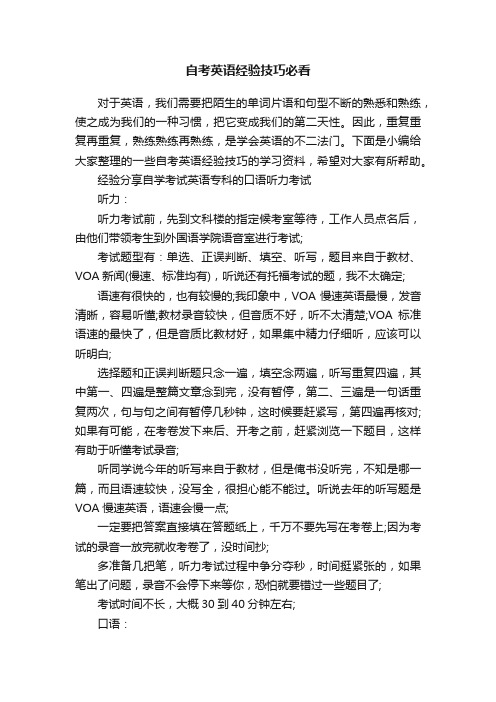
自考英语经验技巧必看对于英语,我们需要把陌生的单词片语和句型不断的熟悉和熟练,使之成为我们的一种习惯,把它变成我们的第二天性。
因此,重复重复再重复,熟练熟练再熟练,是学会英语的不二法门。
下面是小编给大家整理的一些自考英语经验技巧的学习资料,希望对大家有所帮助。
经验分享自学考试英语专科的口语听力考试听力:听力考试前,先到文科楼的指定候考室等待,工作人员点名后,由他们带领考生到外国语学院语音室进行考试;考试题型有:单选、正误判断、填空、听写,题目来自于教材、VOA新闻(慢速、标准均有),听说还有托福考试的题,我不太确定;语速有很快的,也有较慢的;我印象中,VOA慢速英语最慢,发音清晰,容易听懂;教材录音较快,但音质不好,听不太清楚;VOA标准语速的最快了,但是音质比教材好,如果集中精力仔细听,应该可以听明白;选择题和正误判断题只念一遍,填空念两遍,听写重复四遍,其中第一、四遍是整篇文章念到完,没有暂停,第二、三遍是一句话重复两次,句与句之间有暂停几秒钟,这时候要赶紧写,第四遍再核对;如果有可能,在考卷发下来后、开考之前,赶紧浏览一下题目,这样有助于听懂考试录音;听同学说今年的听写来自于教材,但是俺书没听完,不知是哪一篇,而且语速较快,没写全,很担心能不能过。
听说去年的听写题是VOA慢速英语,语速会慢一点;一定要把答案直接填在答题纸上,千万不要先写在考卷上;因为考试的录音一放完就收考卷了,没时间抄;多准备几把笔,听力考试过程中争分夺秒,时间挺紧张的,如果笔出了问题,录音不会停下来等你,恐怕就要错过一些题目了;考试时间不长,大概30到40分钟左右;口语:口语考试也是在文科楼候考室等待,工作人员点到名字后,就到指定位置(一般是在教室外的走廊)检查证件,然后领取考题,给几分钟阅读、准备;考室就在隔壁教室,两位考官,一位与考生交流,另一位打分;两张课桌拼在一起,考生和老师面对面坐着,考生的位置上放着刚刚的考题,供考生查看;这次的考题是口语教材上的一篇课文,第35课Musical Half-Notes,听说前年(2004年)也是考这篇文章;考试的形式有朗读、复述、提问,总的来说,不难;进入考室前,稳定一下情绪,尽量放松、微笑,情绪是会互相传染的,自己保持阳光,老师心情也愉快,这样可以与老师保持有效沟通,得分才有保证;朗读或回答问题时声音清晰,偶尔犯些语法、时态错误也不用紧张,继续说下去就是;考试很快就完事了,朗读、复述,加上4、5个提问,一般在3分钟之内可以结束顺利通过自学考试英语专业经验谈估计英语专业对大家来说是很难的,当年我就因为英语成绩不好而失去学习的动力,可我们如果想再进一步的话,英语水平就很重要了。
如何备考英美文学选读
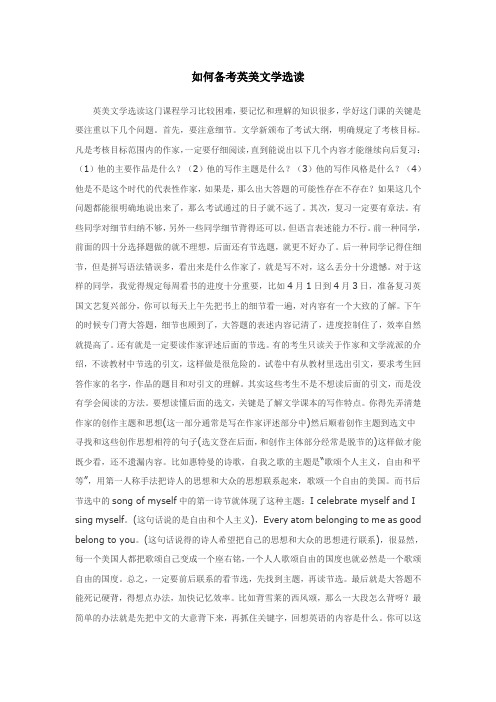
如何备考英美文学选读英美文学选读这门课程学习比较困难,要记忆和理解的知识很多,学好这门课的关键是要注重以下几个问题。
首先,要注意细节。
文学新颁布了考试大纲,明确规定了考核目标。
凡是考核目标范围内的作家,一定要仔细阅读,直到能说出以下几个内容才能继续向后复习:(1)他的主要作品是什么?(2)他的写作主题是什么?(3)他的写作风格是什么?(4)他是不是这个时代的代表性作家,如果是,那么出大答题的可能性存在不存在?如果这几个问题都能很明确地说出来了,那么考试通过的日子就不远了。
其次,复习一定要有章法。
有些同学对细节归纳不够,另外一些同学细节背得还可以,但语言表述能力不行。
前一种同学,前面的四十分选择题做的就不理想,后面还有节选题,就更不好办了。
后一种同学记得住细节,但是拼写语法错误多,看出来是什么作家了,就是写不对,这么丢分十分遗憾。
对于这样的同学,我觉得规定每周看书的进度十分重要,比如4月1日到4月3日,准备复习英国文艺复兴部分,你可以每天上午先把书上的细节看一遍,对内容有一个大致的了解。
下午的时候专门背大答题,细节也顾到了,大答题的表述内容记清了,进度控制住了,效率自然就提高了。
还有就是一定要读作家评述后面的节选。
有的考生只读关于作家和文学流派的介绍,不读教材中节选的引文,这样做是很危险的。
试卷中有从教材里选出引文,要求考生回答作家的名字,作品的题目和对引文的理解。
其实这些考生不是不想读后面的引文,而是没有学会阅读的方法。
要想读懂后面的选文,关键是了解文学课本的写作特点。
你得先弄清楚作家的创作主题和思想(这一部分通常是写在作家评述部分中)然后顺着创作主题到选文中寻找和这些创作思想相符的句子(选文登在后面,和创作主体部分经常是脱节的)这样做才能既少看,还不遗漏内容。
比如惠特曼的诗歌,自我之歌的主题是“歌颂个人主义,自由和平等”,用第一人称手法把诗人的思想和大众的思想联系起来,歌颂一个自由的美国。
而书后节选中的song of myself中的第一诗节就体现了这种主题:I celebrate myself and I sing myself。
- 1、下载文档前请自行甄别文档内容的完整性,平台不提供额外的编辑、内容补充、找答案等附加服务。
- 2、"仅部分预览"的文档,不可在线预览部分如存在完整性等问题,可反馈申请退款(可完整预览的文档不适用该条件!)。
- 3、如文档侵犯您的权益,请联系客服反馈,我们会尽快为您处理(人工客服工作时间:9:00-18:30)。
托马斯.摩尔,克利斯朵夫.马洛和威廉.莎士比亚是英国人文主义的代表。
9. Francis Bacon (1561-1626), the first important English essayist.
费兰西斯.培根是英国历史上最重要的散文家。
(I)Edmund Spenser埃德蒙.斯宾塞
10. the theme of Redcrosse is not “Arms and the man,” but something more romantic-“Fierce wars and faithful loves.”
正是斯宾塞的理想主义,对美的热爱以及精美优雅的诗文韵律是他成为“诗人中的诗人”。
(II)Christopher Marlowe克利斯朵夫.马洛
12. As the most gifted of the “University Wits,” Marlowe composed six plays within his short lifetime. Among them the most important are: Tamburlaine, Parts I & II, Dr.Faustus, The Jew of Malta and Edward II.马洛是当时“大学才子”中最富才华的人,在他短暂的一生中,他完成了六部剧本的创作。其中最负盛名的是:《帖木尔》,《浮士德博士的悲剧》,《马耳他岛的犹太人》以及《爱德华二世》。
24. The successful romantic tragedy is Romeo and Juliet, which eulogizes the faithfulness of love and the spirit of pursuing happiness.
莎翁在其成功的浪漫主义悲剧《罗密欧与朱丽叶》,颂扬了对爱的忠贞及对幸福的追求。
14. Marlowe’s second achievement is his creation of the Renaissance hero for English drama.
马洛的第二项贡献是他创造了文艺复兴时期的英雄形象。
15. His brilliant him to an eminence as the pioneer of English drama.他对戏剧发展的贡献是不可磨灭的,为此,它被后世尊为英国戏剧的先驱。
16. The passionate shepherd to his love激情的牧人致心爱的姑娘
This short poem is considered to be one of the most beautiful lyrics in English literature.
这首短诗是英国文学诗中最优美的抒情诗。
23. In his romantic comedies, Shakespeare takes an optimistic attitude toward love and youth, and the romantic elements are brought into full play.
在他的浪漫喜剧中,莎士比亚以乐观的态度对待爱情与青春,并将浪漫色彩渲染到极致。
第三阶段诞生了莎翁最伟大的悲剧和他自称的黑色喜剧(或悲喜剧),悲剧有:《哈姆雷特》,《奥赛罗》,《李尔王》《麦克白》《安东尼与克利奥佩特拉》《特罗伊勒斯与克利西达》及《克里奥拉那斯》。两部喜剧是《终成眷属》和《一报还一报》。
20. The last period of Shakespeare’s work includes his principle romantic tragicomedies: Pericles, Cymbeline, The Winter’s Tale and The Tempest; and his two plays: Henry VIII and The Two Noble Kinsmen.最后一个时期的作品主要有浪漫悲喜剧:《伯里克利》《辛白林》《冬天的故事》与《暴风雨》。他最后两部剧是《亨利八世》与《鲁克里斯受辱记》。
3. Renaissance humanists found in then classics a justification to exalt human nature and came to see that human beings were glorious creatures capable of individual development in the direction of perfection, and that the world they inhabited was theirs not to despise but to question, explore, and enjoy.人文主义者们却从古代文化遗产中找到充足的论据,来赞美人性,并开始注意到人类是崇高的生命,人可以不断发展完善自己,而且世界是属于他们的,供他们怀疑,探索以及享受。
(III)William Shakespeare威廉.莎士比亚
17. The first period of his dramatic career, he wrote five history plays: Henry VI, Parts I, II, and III, Richard III, and Titus Andronicus; and four comedies: The Comedy of Errors, The Two Gentlemen of Verona, The Taming of the Shrew, and Love’s Labour’s Lost.在他戏剧创作生涯的第一个阶段,他创作了五部历史剧:《亨利六世》,《理查三世》,《泰托斯.安东尼》以及四部喜剧:《错误的戏剧》,《维洛那二绅士》,《驯悍记》和《爱的徒劳》。
《仙后》的主题并非“男人与武器”,而是更富浪漫色彩的“残酷战争与忠贞爱情”。
11. It is Spenser’s idealism, his love of beauty, and his exquisite melody that make him known as “the poets’ poet.”
5. Wyatt introduced the Petrarchan sonnet into England.
怀亚特将彼特拉克的十四行诗引进英国。
6. The first period of the English Renaissance was one of imitation and assimilation.
8. The most famous dramatists in the Renaissance England are Christopher Marlowe, William Shakespeare, and Ben Jonson.
文艺复兴时期英国最著名的戏剧家有克利斯朵夫.马洛,威廉.莎士比亚与本.约翰逊。
21. Shakespeare’s sonnets are the only direct expression of the poet’s own feelings.
22. Shakespeare’s history plays are mainly written under the principle that national unity under a mighty and just sovereign is a necessity.莎翁的历史剧都有这样一个主题:在一个强大英明的君主统领下的国家,统一是非常必要的。
13. Marlowe’s greatest achievement lies in that he perfected the blank verse and made it the principal medium of English drama.
马洛的艺术成就在于他完善了无韵体诗,并使之成为英国戏剧中最重要的文体形式。
英国文艺复兴初期只是一个学习模仿与同化的阶段。
7. The goals of humanistic poetry are: skillful handling of conventions, force of language, and, above all, the development of a rhetorical plan in which meter, rhyme, scheme, imagery and argument should all be combined to frame the emotional theme and throw it into high relief.人文主义诗歌的主要目标是对传统习俗的熟练运用,语言的力度与气概,而最重要的是发展了修辞模式,即将格律,韵脚(式),组织结构,意象(比喻,描述)与议论都结合起来勾画出情感主题,并将其极为鲜明生动的表现出来。
在第二阶段,他写了五部历史剧:《理查三世》,《约翰王》,《亨利四世》,《亨利五世》以及六部喜剧《仲夏夜之梦》,《威尼斯商人》,《无事生非》,《皆大欢喜》,《第十二夜》,《温莎的风流娘儿们》,还有两部悲剧:《罗密欧与朱丽叶》和《裘利斯.凯撒》。
19. Shakespeare’s third period includes his greatest tragedies and his so-called dark comedies. The tragedies of this period are Hamlet, Othello, King Lear, Macbeth, Antony and Cleopatra, Troilus and Cressida, and Coriolanus. The two comedies are All’s Well That Ends and Measure for Measure.
